IN THIS ISSUE IS SIMULATING DISABILITY ABLEIST?
THE WORLD’S LARGEST RESEARCH STUDY INTO ME/CFS DECODEME USING OT SKILLS AS AN EMOTION REGULATION PATHWAY LEAD REMOVING JUDGEMENTS EXPLORING OT AND ENGAGING WITH PEERS OT PODCASTS ISSUE 51____MAR/APR 2023 45 28 22 + COLUMNS / PRODUCTS / CPD / EVENTS / MENTAL HEALTH
PG 15

































































Delicious, nutritious and safe texture modified meals delivered ✓ A range of over 60 dishes in IDDSI Level 4, 5 and 6 designed for the IDDSI required texture. ✓ Choose from breakfast, mains, minis and desserts. ✓ Helping you to support and keep your patients safe at mealtimes. ✓ No contracts, order as much or as little as you like. PROUD SUPPORTER OF GOLD SPONSOR We are proud Gold sponsors of the International Dysphagia Diet Standardisation Initiative To order brochures for your patients or for a free demo call 0333 433 0178 or visit itsmadeforyou.co.uk Soft & Bite-Sized Meals Minced & Moist Meals Puréed Meals LEVEL 4 LEVEL 5 LEVEL 6
THE TEAM
EDITOR
ROSALIND TULLOCH ASSISTANT EDITOR
KATIE
 CAMPBELL DESIGNER
CAMPBELL DESIGNER
FIONNLAGH BALLANTINE PRODUCTION
DONNA DEAKIN
Kate Sheehan, AbleOTUK team, Sally Feyi-Waboso, Pippa Stacey, Fiona Green, Beth Wardle, Lydia Wilkins
GET IN TOUCH
2A Publishing, 20-23 Woodside Place, Glasgow, G3 7QL 0141 465 2960

OT-Magazine.co.uk
The OT Magazine
@OT_Magazine
@TheOTMagazine
Enquiries@2APublishing.co.uk
DISCLAIMER
The OT Magazine is published by 2A Publishing Limited. The views expressed in The OT Magazine are not necessarily the views of the editor or the publisher. Reproduction in part or in whole is strictly prohibited without the explicit written consent of the publisher. Copyright 2023 © 2A Publishing Limited. All Rights Reserved. ISSN-2056-7146
In this issue, the team at AbleOTUK explore the very interesting topic of simulating disability for the purposes of occupational therapy education. They discuss the ramifications of simulated learning and question if this practice is ableist. It raises some very important questions and highlights the need for further exploration surrounding this topic. You can read more on page 15.
We hear from an OT who has been involved in setting up a rehabilitation centre in Malawi, combining occupational therapy and ophthalmology in a unique rehab unit that works with patients undergoing cataract surgery. We also get an insight into the role of an emotion regulation pathway leader who is using her OT skills to work with people who are living with emotionally unstable personality disorder (EUPD). Read more on page 28.
Pippa Stacey, a writer and disability advocate who lives with ME/CFS, shares the important work that DecodeME are doing through the largest study on ME/CFS that we
have seen to date. Turn to page 22 to discover the impact that this study is already having on the chronic illness community.
We will be attending Naidex on 22-23 March at the NEC, the event offers some great CPD opportunities and some very interesting speakers. If you are attending, please join us on stand J33.
We hope you enjoy this issue, if you would like to contribute an article to The OT Magazine, please email Ros@2APublishing.co.uk.
#51 MAR/APR 2023 SUBSCRIBE TO SEE P66 MAGAZINE
WELCOME
IN THIS MONTH’S
ISSUE
THEY DISCUSS THE RAMIFICATIONS OF SIMULATED LEARNING AND QUESTION IF THIS PRACTICE IS ABLEIST OT-MAGAZINE.CO.UK | 3 The OT Magazine, Editor SUBSCRIBE FOR ONLY £9.99 @TheOTMagazine / @OT_Magazine / @TheOTMagazine Go to OTMagazine.co.uk/Subscribe
CONTRIBUTORS
WHAT’S NEW 07
Keeping you up-to-date with the healthcare sector
11
THE PERFECT THERAPIST
Kate Sheehan reflects on how important it is to acknowledge mistakes in our professional lives
12
BREAKING BOUNDARIES
Sally Feyi-Waboso shares the collaborative work being undertaken at a new unit in Malawi

15
IS SIMULATING DISABILITY ABLEIST?
AbleOTUK ask if the act of simulating disability is more problematic than helpful
PRODUCT FOCUS 19
A look at the innovative products and daily living aids in the marketplace
DECODEME 22
Pippa Stacey shares what a new ME/CFS study could mean for the community
DAY IN THE LIFE 25
Meet Fiona Green, a senior OT working within a community therapy housing team
WRITING FOR WELLBEING 26
How can therapeutic journaling be used as a tool to improve wellbeing?

28
REMOVING JUDGEMENTS
OT Beth Wardle explains how to support and remove stigma surrounding people living with emotionally unstable personality disorder
ACCESSIBLE STAYCATIONS 31
Holiday ideas for clients living with mobility impairments
4 | OT-MAGAZINE.CO.UK
12
ISSUE 51 MAR/APR
26 CONTENTS



OT-MAGAZINE.CO.UK | 5 45 52
do OTs need to know about the new stairlift regulations? STAIRLIFT SAFETY 61 Dates for your diary in 2023 EVENTS CALENDAR 64 Lydia Wilkins reveals what led her to write her first cookbook THE AUTISM FRIENDLY COOKBOOK 42 Discover more innovative products and daily living aids in the marketplace PRODUCT FOCUS 35 OT podcasts for you to relax with PODCAST AND CHILL 45 Empowering patients to manage their health at home through tech DIGITAL HEALTH TRACKING 58 Advice on keeping young people safe online SAFETY NET 52 Mobility aids and sensory toys for your younger clients KIDS’ PRODUCTS 55 The Bristol-based charity providing children with an interoception paradise OT THROUGH PLAY 50
What
HAVING A TRUSTED PARENT OR GUARDIAN THAT THEY KNOW WILL SUPPORT THEM IF THEY NEED HELP IS KEY

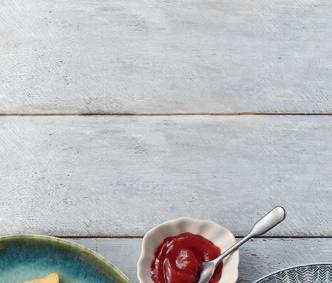













Easy, nutritious and friendlyWiltshire Farm Foods delivers. Have peace of mind that individuals are eating well at home with delicious dishes to suit most tastes and diets. DELICIOUS AND NUTRITIOUS MEALS No contract or commitment Energy-dense smaller portions Over 340 delicious dishes Free delivery by regular drivers Quick and easy to cook in oven or microwave To order brochures or go online www.wiltshirefarmfoods.com Call 0800 524 4207 Delivered straight to the freezer
Wiltshire Farm Foods is part of the apetito family, providers of award-winning meals to hospitals. apetito.co.uk
WHAT’S NEW
VACANCIES PUTTING “SIGNIFICANT STRESS” ON SOCIAL CARE OTS

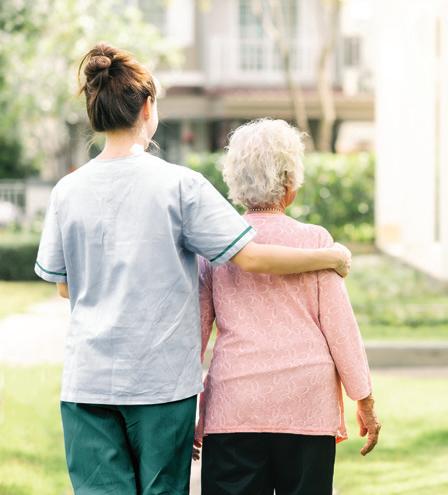
New figures from Skills for Care show that vacancies for OT posts within council adult services departments have increased since last year, as has staff turnover, leading to warnings that this could cause “significant stress” on OTs working for councils.
Speaking to Community Care, RCOT professional adviser Lauren Walker noted that the College are aware that these are “significant staff shortages” within the social care sector that are causing stress in the form of increased workloads, which in turn negatively impacts remaining staff’s mental health.
She told Community Care: “Whilst the government has spoken of the need to address this workforce challenge, the solutions coming
forward are merely sticking plasters when it is clear that more fundamental reform of social care is required.
“Last year we laid out a roadmap to solving the workforce crisis which included placing a greater focus on OTs and the contribution they can make to meeting the rehabilitation challenge and also in tackling delayed discharge.
“We also spoke of the need to focus on the reasons why people are leaving the social care workforce such as pay, flexible working patterns, workplace culture and the lack of parity with colleagues working in the NHS. As these figures so clearly demonstrate there remains a significant recruitment challenge and we need to be doing more to encourage people from all backgrounds to train as a care professional.”
OT SUPPORTS UKRAINIANS WITH COMPLEX INJURIES
A WHO-backed rehabilitation centre in Ukraine is helping people who have been affected by Russia’s invasion of Ukraine through occupational therapy, with additional support from colleagues and organisations around the world.
A rehabilitation centre in Rivne, a city in the West of Ukraine, has been transformed into a national centre for spinal cord injury and traumatic brain injury care, with vital equipment and funding supplied by the Foreign, Commonwealth and Development Office in the UK.
Yuliya Tereshkovich, one of around only 50 OTs in Ukraine, said that she feels her work in the centre is making a huge difference. “It’s just wonderful, I barely have words to describe it. I feel like the entire world is now present in Rivne,” Yuliya said, referring to the international consultants and foreign guests who have been visiting the centre, including Johanna Wangdell, an OT from Sweden.
“I’m so happy to have a mentor like Johanna, who shares her expertise with us completely free of charge and has all the answers to all our questions,” she said. “Most patients here are young, they’re around my age. I really want to keep finding ways to help them. In the meantime, we as occupational therapists will keep doing everything in our power to help these people achieve independence in selfcare. And we will build on that for their future needs.”
WE EXPLORE WHAT’S HAPPENING IN THE HEALTHCARE SECTOR, FROM NEW PRODUCTS AND SERVICES TO INSPIRATIONAL STORIES OT-MAGAZINE.CO.UK | 7
WILTSHIRE FARM FOODS ON THE HUNT FOR OTS FOR PODCAST
Specialist ready meal delivery service Wiltshire Farm Foods, who fork with OTs to provide nutritious and enjoyable meals for people who may have dietary requirements, are looking for OTs to join them on their podcast, The Dietician Diaries.

The podcast, titled “how can OTs make meals more enjoyable”, looks to include an OT with a discussion including their two company dietitians to explore what OTs can do to ensure patients are eating nutritious meals and enjoying mealtimes for people who may have dietary requirements, covering issues such as ensuring people enjoy meals while living with swallowing difficulties, kitchen assessments, and taking patients’ appetites and energy levels into account.
If you would like to be involved in this podcast episode to share your expertise in this area, please contact Katie Oliver by emailing Katie.Oliver@apetito.co.uk
COMPLETE CARE LAUNCHES “OCCUPATIONAL THERAPIST RECOMMENDED” RANGE
Over 500 products on the Complete Care Shop will now sport their new green “OT Recommends” badges, showcasing that the product has been identified as offering the best functionality, ease of use, safety and value for money by its team of “over 60 fully qualified occupational therapists”.
The range of products, which includes mobility aids, bathing products, and daily living aids, was rigorously assessed against a number of key criteria, which included how well the product met its own claims, how easy it is to use, how much it stands up against UK safety standards, and how costeffective it is.
“Once our occupational therapists have evaluated the product against
all the criteria and it has passed with flying colours, we are delighted to give it the ‘OT Recommended’ seal of approval to reassure our customers that they are spending their money wisely,” said Rachel Hutchinson, OT and clinical director at Complete Care Shop.
“We hope that an OT Recommended product can help customers to narrow down their search with confidence and then, to ensure it’s suitable for their specific needs, refer to our buying guides and help pages on the website. Products can be easily identified by the green OT Recommended badge on the product image.
“If customers require further personalised advice a free online chat and a telephone line connects directly to our Occupational Therapy team or there is a further option to book an hour’s private virtual assessment where the home and needs can be fully assessed.”

8 | OT-MAGAZINE.CO.UK
SUPERMARKET LAUNCHES ADAPTABLE FASHION RANGE

George at Asda has launched a new line of affordable adaptive clothing for younger people, following the success of its Easy Wear school range that was launched in September of last year.
The range of 24 pieces includes items with hidden hook and look fasteners on necklines, higher backs and longer legs on trousers, and holes to allow for easy access to feeding tubes or lines, and is available for ages three through 16.
George buying manager Vicki Radford employed the help of an award-winning deaf and blind artist, 14-year-old Ava Joliffe, to ensure the clothing was up-to-scratch for the people who might need it.
“It was really important to Ava that we designed our adapted collection in line with the main kidswear range, so children with disabilities can wear the same as their friends… and it was really important to us that these pieces remain competitively priced and affordable to all our customers,” said Vicki.
BATHROOM SUPPLIER GIVES BACK WITH CHARITY DISCOUNT
Accessible bath specialist G360 Bathrooms has partnered with the MS Society to offer a 10% discount on its accessible bath for people living with MS, with each discounted sale generating a donation from the specialist back to the charity.
Peter Eckhardt, CEO at Gainsborough Healthcare Group, said: “Ensuring everyone can bathe safely has been, and will always be, our priority. Awareness of this enabling promise will now be more widespread through the MS community as we proudly begin our new relationship with the MS Society. We are delighted to have been selected by the charity as its recommended easy access bath and bathroom provider. Our ethical, caring and consultative approach will uphold the values of the charity whilst delivering quality solutions that
improve lives for good.”
G360, which is part of the Gainsborough Healthcare Group, offers a complete assessment, design and installation service, and can provide accessible baths, showers and wet rooms designed to fit the users’ needs.

Sam Walker, executive director of services and support at the MS Society, said: “We’re really pleased to be partnering with G360 Bathrooms. It’s great that if people are considering a G360 bathroom they now get a discount which could make a big difference. Living with MS can be relentless, painful and disabling, and for many people, access to an accessible bathroom is essential. We’re also incredibly grateful that we’ll receive a donation from every G360 Bathrooms purchase. These vital contributions will help us fund support services such as our free MS Helpline, and world-leading research to find treatments for everyone living with MS.”
“Working with Ava was a real joy; we’re all so proud of the pieces we’ve created together, and as a brand, are delighted to have been able to extend the range past schoolwear to encompass everyday dressing.”
The Easy On Easy Wear range is available in-store now, with pieces priced from £9.
OT-MAGAZINE.CO.UK | 9



KATE SHEEHAN
DIRECTOR, THE OT SERVICE
The OT Service provides high quality advice, consultancy and training to manufacturers, retailers and service providers. It also provides occupational therapy clinical services in housing and equipment to case managers, solicitors and private individuals via its handpicked network of occupational therapists. For more info email kate@theotservice.co.uk

THE PERFECT THERAPIST
I have been reading about Alice Hortop’s, Belonging Centred Practice theory and recently listened to the podcast by The Brave OT, Carlyn Neek interviewing Alice about how she has developed her understanding of herself and the need to belong. There was a plethora of ideas, concepts and thoughts that I need to personally review, but one that really resonated with me was the discussion around why we never talk about the mistakes we have made in our professional life?
There is this societal need to strive for perfection and be a faultless therapist, yet none of us are perfect and if we are totally honest the mistakes we have made over our careers can lead to us being much more reflective and effective therapists.
Striving to this utopia of perfect practice is one that can only lead to failure as it is not achievable. By putting unrealistic pressures on ourselves, we can impact our own wellbeing and ultimately how we work effectively in collaboration with our clients.
One of my early career failings was to not listen to my clients and already be working on a solution before even visiting them in their own home. One specific case was a lady in her late 90s who lived in the east end of London. Struggling to use the bath, my solution was to rip the bath out and put in a level access shower, which was arranged with a local contractor. Job done, I thought.

I returned to visit this lady almost a year later as her mobility had decreased and she could no longer manage the stairs. On discussing the shower she said: “I don’t use it, I have never used it, I hate it and would like my bath back.” The strength of her response to the shower took me by surprise. It turned out I had not spent time building up a relationship with her, asking about how she used her bath or what her home meant to her. I just looked at managing personal care and provided a solution.
It turned out she had been born in the property and the installation of an indoor bathroom was a major milestone in her and her family’s life. It was where she bathed, yes, but she also bathed with her husband in that bath, she also had done her large washing in it using a dolly, she had washed her dog in it, and when tired at the end of day she bathed in it, remembering all the lovely times she had spent with her dad, siblings and mother discussing life’s joys and woes. I had removed something that made her feel she belonged and I had left a huge hole in her life. I had made a massive mistake by thinking a bath was just about personal hygiene when it was so much more.
My failure could have been put down
to my lack of knowledge or skills, pressure of work, limited supervision, but on reflection it was more about not really understanding what was needed physically, psychologically and emotionally, and considering the whole person and those in her life that made her feel like she was part of something. I was initially aiming for the occupational therapy utopia of making someone independent, whereas in reality we are all interdependent. I had really failed to understand her needs and dare I say, her wishes.
I learnt so much from her, and my approach to her stair mobility was very different. I had gone in thinking of putting in a stairlift, whereas what she wanted was to be supported to move all her belongings downstairs and use the front parlour as her bedroom.
This is not the only mistake I have made, and I am going to think more about my mistakes in the future and maybe one day write a longer article about some of them.
So, let’s be brave, acknowledge our mistakes, understand what and how we would do things differently and share our learning, because every day is a school day and adds to our professional development.
SO, LET’S BE BRAVE, ACKNOWLEDGE OUR MISTAKES
OT-MAGAZINE.CO.UK | 11
BREAKING BOUNDARIES
Mulanje Mission Hospital (MMH) is an innovative new unit that opened its doors in January 2023 where OT, Sally Feyi-Waboso and her ophthalmologist husband, Andrew, are working collaboratively in offering ophthalmology and rehabilitation services. The new unit has seen OT breaking boundaries and doing eye assessments like visual acuity assessments, biometry and keratometry for preoperative cataract patients.
Dr Arie Glas, the medical director at MMH, had big dreams and plans for the hospital when he identified the need for eye and rehabilitation services. Dr Glas approached and secured funding from The Carmellia Foundation, Christian Blind Mission (CBM) and others to create a purpose-built unit for the new services.
A chance introduction saw Dr Glas inviting Andrew and Sally to advise and help set up the eye and rehabilitation units respectively. In April 2022, when Andrew and Sally visited MMH, the building still had no roof and completion seemed a long way off but with persistence and determination, the building was completed and handed over by the contractors in December 2022.
In December 2022, MMH advertised locally for the role of rehabilitation technician (RT) and after shortlisting and the interview process, Eunice Mcheka was employed and now works with Sally in the new rehabilitation unit.
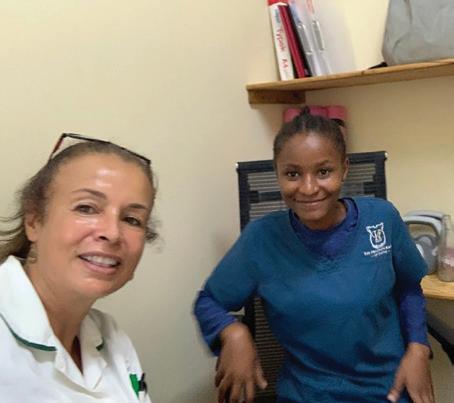
The new unit opened its doors to patients in January 2023 with an official opening planned for 2 March 2023.
MULANJE MISSION HOSPITAL
The hospital is situated in Mulanje, a densely populated district in the southern region of Malawi.
It was originally located on the slopes of Mount Mulanje (to avoid the attention of the slave traders) but in 1928, after the abolition of the slave trade, MMH was moved to its current location, approximately 10kms from the original site.
MMH is a 220-bed facility that provides a full range of medical, surgical, and paediatric services. The hospital together with the local district hospital serves a population of approximately 800,000 across 72 villages.
Patients access the hospital from over the border from neighbouring Mozambique for outpatient, in-patient, non communicable diseases (NCD), and HIV/Aids services.
12 | OT-MAGAZINE.CO.UK
Sally Feyi-Waboso shares the collaborative work being undertaken in a new unit at Mulanje Mission Hospital in Malawi, as occupational therapy meets ophthalmology
left: Map of Malawi and location of MMH
THE HOSPITAL TOGETHER WITH THE LOCAL DISTRICT HOSPITAL SERVES A POPULATION OF APPROXIMATELY 800,000 ACROSS 72 VILLAGES
TANZANIA LAKE MALAWI
MOZAMBIQUE BLANTYRE MULANJE
LILONGWE
ZAMBIA
REHABILITATION WORK
According to The Population and Housing Census (2018), in Malawi there are 1,734,250 persons living with disabilities, representing approximately 11.6% of the total population of people over five years of age.

The need for improved rehabilitation services in Malawi is well recognised as The Human Resources for Health (HRH 2030) highlighted that Malawi is among the 57 countries with a crisis in human resources within health and that the health sector in Malawi has a critical shortage of trained rehabilitation healthcare workers.
Occupational therapy is in its infancy in Malawi with no in-country training and fewer than 10 OTs in a population of 19 million. This collaboration further illustrates the versatility of OT in a developing world setting.

EYE WORK
It is estimated that the number of cataract operations per million population per year (CSR) in Malawi is 268, one of the lowest in the world (Seva.org).
With less than one ophthalmologist per million population, five optometrists and seven allied ophthalmic health personnel per million respectively, any collaboration is welcome.
The eye unit has just recruited three nurses currently receiving local eye training.
A clinical officer (CO) is currently being trained in cataract surgery in Tanzania. He will complete his training in 2024 and return to the unit. The opportunity for ‘on the spot’ visual rehabilitation input is enhanced by having the rehabilitation team involved in eye care visual assessments. This is an often overlooked, life-enhancing intervention for the significant minority for whom no curative treatment is available in Malawi.
The new unit is unique in that it offers rehabilitation and eye services in a place where the rehabilitation staff have acquired new skills in order to support the eye unit. Sally and Eunice regularly engage patients in eye assessments including visual acuity, keratometry and biometry.
For more information on the work Sally is doing at MMH please email: ot4sally@gmail.com
OT-MAGAZINE.CO.UK | 13
Top right: Rehabilitation patient leaving with a new wheelchair
Bottom left: Sally FeyiWaboso and Eunice Mcheka
Bottom right: Team at MMH
OCCUPATIONAL THERAPY IS IN ITS INFANCY IN MALAWI WITH NO IN-COUNTRY TRAINING AND FEWER THAN 10 OTS IN A POPULATION OF 19 MILLION
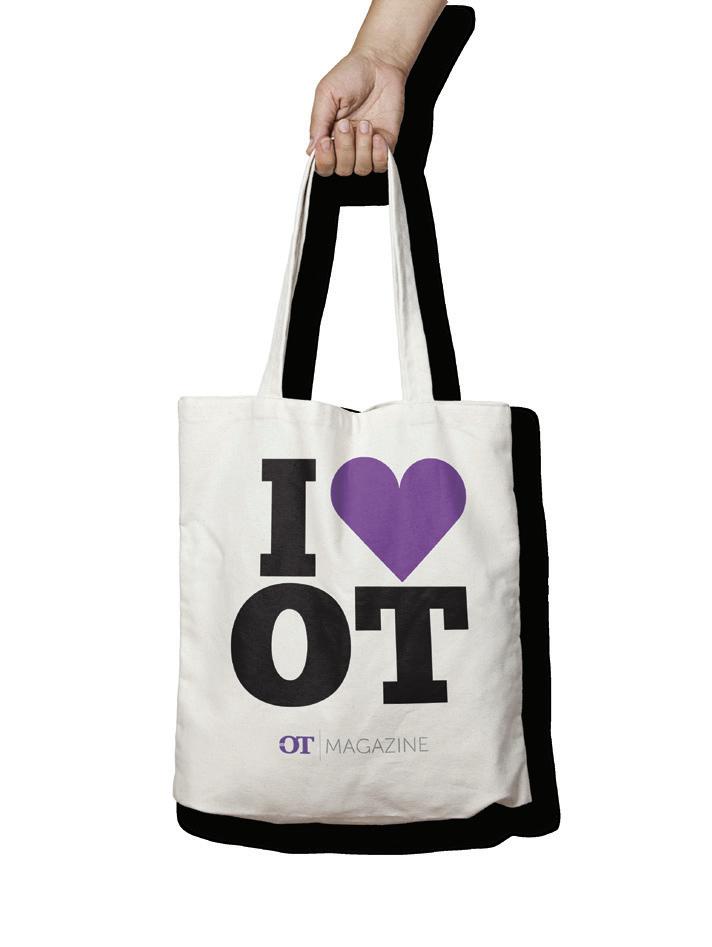

Visit stand J33 at Naidex to claim your FREE tote bag when you sign up to The OT Magazine for only £9.99 ot-magazine.co.uk/subscribe | 0141 465 2960
IS SIMULATING DISABILITY ABLEIST?
AbleOTUK members explore the topic of simulating disability as part of occupational therapy education and discuss the ableist connotations it can present
Arecent video post on social media showed occupational therapy students participating in simulated learning to convey the experience of using a prosthetic limb. This generated a discussion amongst AbleOTUK members about the ethics and morals of simulated learning, leaving us with uncomfortable questions: is our simulation practice ableist, and do we need to change? Do we need to use all types of simulation in preregistration or should some types be stopped? To what degree is it possible to simulate disability? Which types of simulation are effective in supporting learners to achieve learning outcomes? To answer these questions we spoke to Caroline Coster who delivered the lived experience portion of the session and reached out to occupational therapists and students with lived experiences of disability.
Pre-registration occupational therapy courses engage in simulation (as outlined in preregistration education standards) but how simulation is delivered is not yet regulated in the UK. There is a spectrum of practice within education ranging from case studies on paper, and role play, to high-tech immersive reality to simulate disabilities.
This is not a new debate in the profession. Simulated experiences of disability, for example, using visual impairment goggles, wheelchairs and hoists, being fed, dementia and autism simulations, even wearing body suits which simulate obesity have been used and critiqued within healthcare and
occupational therapy education and continuing professional development before.
What are the experiences and views of simulated disability within occupational therapy today?
WHAT ARE THE EXPERIENCES AND VIEWS OF SIMULATED DISABILITY WITHIN OCCUPATIONAL THERAPY TODAY?
CAROLINE COSTER’S VIEW

Regarding the social media video: “This was a small part of an amputee workshop, which also included speaking to Caroline Coster (quadruple amputee and blogger) about her lived experiences. They also spoke to occupational therapists and physiotherapists working in this specialist area before trialing the early walking aids to deepen their appreciation.”
Caroline had previously supported students in sharing her lived experience of being a quadruple amputee alongside setting some problem-solving activities. Despite not having been directly involved in planning the full session she felt comfortable with the use of simulation as a valuable learning experience alongside the lived experience discussion. Caroline felt the students were sensitive and insightful in their questioning and she was upset that this had been viewed in a negative light, which demonstrates how nuanced this topic may be. She also wasn’t offended by the music and noted that the students looked focused in the video.
Caroline recognised that universities may find it difficult to find someone with lived experience who has the time or energy to give and we also discussed the issue of appropriate remuneration. Caroline is keen to continue to support occupational therapy education and also provides support for other quad amputees. She can be contacted via Twitter @CCquad or Facebook @JourneyOfRecoveryCC
OT-MAGAZINE.CO.UK | 15
left: Caroline Coster
THEM AND US
Disabled OTs spoke about how they felt being in the room when disability simulations were happening - particularly where there was no lived experience represented. They discussed how the language used was sometimes ‘othering’ and may have served to perpetuate a divide between non-disabled occupational therapists and the disabled populations. Shelton (2019) describes a potential discomfort for disabled people engaging in simulations intended to replicate their experience.
Laura Casey remarked that “Booksmart stuff is great, but reality is different”, and Jordan Gooding spoke about the importance of empowering occupational therapists with their own lived experience of disability within the profession, requiring us to support disabled OTs to feel welcomed and belonged, which sadly isn’t always happening currently.
DISABILITY IS NOT ENTERTAINMENT
Many of us reflected on our experiences of “trying out” a wheelchair, or simulating sensory impairment with some finding it a formative learning experience that they carried with them their whole careers, and others finding it “fun”. Fun activities within pre-registration do contribute to student satisfaction (something universities are very keen on due to NSS scores). However, fun is not the point of the educational experience of simulation. Disability and ableism is not fun. Ableism is not fair or fun. Byrne-Haber (2020) outlines five reasons that the experience of disability can not be simulated completely.
Hattie - a self-proclaimed autistic, mad OT - highlighted that: “Disability isn’t a funfair attraction and the best way to learn is to meaningfully engage with disabled people.” Do simulations “offensively exaggerate” someone’s lived experience and could they even diminish our willingness? As Hattie says, it is vital to be “open, curious and empathetic toward the experiences of people we work with, especially where those experiences are different to our own, recognising everyone as the expert in
with lived experience from design to implementation, and to reflection.
Sorcha Dunne wonders if “trying on” of disability is “performative allyship” and asks us to “listen to and engage with disability activists.” This is further supported by VanPuymbrouck et al. (2017). Twitter, and more recently TikTok, are full of disability activists creating content and responding to and engaging with sensitively addressed comments and questions from their audience.
DOES DISABILITY SIMULATION CHANGE ATTITUDES?
The effectiveness of disability simulation on changing attitudes will depend on how it is delivered in classrooms, and why.
One study compared occupational therapy students completing an accessibility audit versus using a wheelchair. “The results of this study demonstrate that disability simulation is no better than an accessibility audit in improving attitudes toward people with disabilities. Therefore, educators should cease use of these activities.” (Pebdani and Bourgeois, 2019).
A meta-analysis (Ma and Mak, 2022)
their lives and experiences.”
Leo and Godwin (2016) explored how individuals with a disability felt about simulated experience and their responses were summed up in three themes:
Disability mentors required
Life is not a simulation
Why are they laughing
All of these themes demonstrate the importance of including people
of mobility simulation programmes demonstrated mixed impacts, including the consideration of the potential emotional impact on participants. Which poses questions about the duration, type of simulation, and the debriefing offered.
Feldner et al. (2022) stated: “... simulations have increasingly been critiqued for distorting the reality of living with disability, reproducing stereotypes that disability is related to incompetence and dependency of the person, and failing to contextualize the lived experience
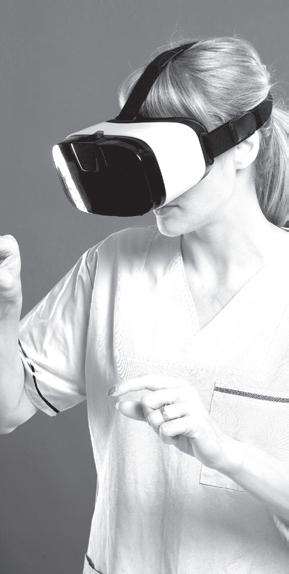
SIMULATIONS HAVE INCREASINGLY BEEN CRITIQUED FOR DISTORTING THE REALITY OF LIVING WITH DISABILITY
16 | OT-MAGAZINE.CO.UK
of disability from the perspective of people with disabilities themselves… studies outside rehabilitation have shown that disability simulation produces more negative attitudes toward disability…further research is warranted to more deeply examine changes in both explicit and implicit attitudes using strategies other than simulation.”
Pattern (2016 p8) argued: “What if we show (in simulation) how difficult it is for an expert wheelchair user to navigate an appointment or work due to unreliable transportation options? What if we listen as wheelchair users explain what they deal with and the bias they face? We understand physical inaccessibility, but do we see the systemic bias that makes an environment difficult to navigate due to stigma, discrimination, low expectations, and policies that deny inclusion and full participation?”
Dr Michelle Nario-Redmond (2019) supported both Laura Casey and Jordan Gooding in stating that we seek to recognise what other factors may be important to the person with lived experience such as economic factors, upbringing, and intersectional identities.
Sorcha Dunne also asks us to question the view that it is important for non-disabled OTs to experience the situation themselves and whether this “furthers the issue that disabled narratives are less valued than others.”
AbleOTUK position statement on the
use of simulating disability within preregistration education and continuing professional development
As the UK occupational therapy affinity group for therapists with disabilities and long-term conditions within the profession, we recommend:
Significant professional reflection and debate on whether the current practice of simulating disability (in the context of preregistration, in all its forms) is ableist. Reflection requires insight into ableism and anti-ableist educational practices, with the consideration of intersectional identities. Staff and students may benefit from mandatory “what is ableism” sessions prior to engaging in simulation.
Further practical and research exploration of the question: What does effective anti-ableist simulation in pre-registration education look like?
That RCOT considers adopting the CAOT joint statement on inclusive education for persons with disabilities until the UK creates their own statement. In order to value the role of lived experience from within the profession, seeking to make occupational therapy education and the profession antiableist.
Working with people with lived experience and disability

advocacy organisations to co-design education (including but not limited to simulated experiences) in appropriate, antiableist, sensitive ways (and with appropriate remuneration to them).
Our initial response to the video reflects the complexity that this topic raises. On further exploration, it appears that the simulation in question was part of a wider piece of learning which most importantly included the voices of lived experience.
“Those of us with lived experience of disability question what we learn from simulation of disability. We acknowledge that people learn through experience and experiencing what it might be like is valuable. However, we must ensure that as a profession we reflect on how this practice might be seen as ableist by those with lived experiences. There are lots of experiences that simulation cannot demonstrate, for example: fatigue, living in pain, often having to justify yourself, often not being believed. It’s really important that we ensure that students learn from those with lived experiences.”
Caroline also reminds us: “If you have met one person with a quadruple amputation you have met one person with a quadruple amputation.”
We must listen, uplift and respond to the lived experiences of every single person we work with regardless of our own experiences of disabilitysimulated or lived.
OT-MAGAZINE.CO.UK | 17
AKW Rise & Fall Bidet


















The clinical features and benefits of the AKW Rise & Fall Bidet help to promote dignity and independence for clients with a range of requirements. Scan this QR code to see a video of Kate Sheehan, Director of The OT Service, expertly demonstrate the use of the AKW Rise & Fall Bidet
If you would like to discuss this product with your local AKW representative call 01905 823298, email marketing@akw-ltd.co.uk or visit www.akw-ltd.co.uk/contact





PRODUCT FOCUS
SELECT HIGH DENSITY MATTRESS TOPPER
This mattress topper adds an additional layer to improve the comfort and support of a mattress. The gel-infused, high-density memory foam is designed to fit the contours of the body, alleviating joint, neck and back pain. Designed to aid anyone who struggles with sleep or discomfort in bed, the material is breathable, it includes a washable cover and has a slip-resistant mesh to hold it in place.



Viscosoft.com
FIDGET RING
This adjustable Sterling silver fidget ring is a discreet and reassuring item that can help people cope with anxiety in periods of stress or uncertainty. It looks beautiful when worn and allows the wearer to move and slide the balls on the ring to help ease any feelings of anxiety and worry.

ot-magazine.co.uk | 19
01
EVERY ISSUE WE BRING YOU THE LATEST PRODUCTS FROM ACROSS THE MARKET TO HELP YOU IMPROVE THE LIVES OF YOUR CLIENTS
02
01 02
NotOnTheHighStreet.com
03

JAR OPENER
For anyone who struggles to open the lids on jars due to limited strength or dexterity, this jar opener will come in very handy. It offers an easy-grip handle for users to place the jar opener on top of a lid and effortlessly twist it open. The stainless steel teeth grip the lid and the soft non-slip handle cushion the user’s hand.
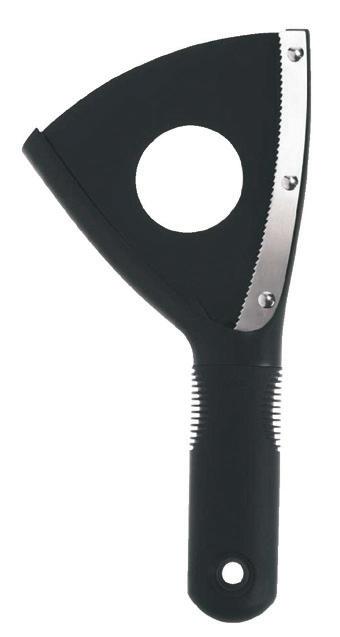
OxoUK.com
04
LONG-HANDLED FOOT BRUSH AND FILE
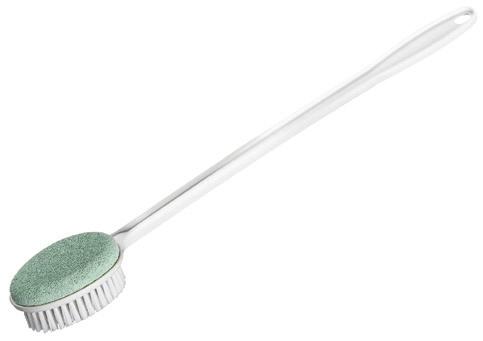
Designed for users who struggle to bend enough to reach their feet to wash them or to file the hard skin away, this brush and foot file is a lifesaver. The long handle on this brush allows users to reach their feet from a standing or seated position, and it can be bent into the best angle for use to keep their toes clean and soft.
IncontinenceShop.com
05
EXFOLIATING GLOVES

Exfoliating the skin on our body is often something that is overlooked in a skincare routine. However, exfoliating the skin can have great benefits from removing dead skin and reducing the risk of ingrown hairs, to promoting blood flow and reducing scarring and uneven skin tone. It couldn’t be easier to exfoliate your skin, simply recommend patients to choose a simple pair of exfoliating gloves and use when they are bathing.
Boots.com
20 | ot-magazine.co.uk
03 O4 05
06

MOTOMED LOOP.LA
The MOTOmed loop.la is designed for leg and arm training for anyone who needs to strengthen their muscles and improve mobility. It has a 7-inch touch display screen that allows for easy and intuitive operation, allowing users to switch easily between leg and arm training. It includes therapy and motivation programmes, as well as games and videos for users.
Medimotion.co.uk
07
SEX STOOL POSITIONING AID
This positioning aid may look like a simple stool, but it offers support and stability to allow users to reduce strain and enjoy sex more comfortably. The stool is designed with a heavy-duty tubular steel frame and can hold weights of up to 300lbs (21st), it is flexible, easy to clean and it looks discreet enough to pass as a standard stool.


SPOKZ.CO.UK
PIVOTELL PILL CRUSHER
The Pivotell Pill Crusher is designed to take the work out of grinding your tablets. Simple to use, and easy on the wrists. The fit of the mortar and pestle limits the pill particles that pass into the jar and gives you the finest pill powder.
Pivotell.co.uk

ot-magazine.co.uk | 21
08
06 07 08
saliva sample for lab analysis using a bespoke ‘spit kit’. The research aims to pinpoint genetic causes of the condition, so that we can better understand it and work towards developing targeted treatments. Essentially, it’s the study that people with ME/CFS have been crying out for - some of them for decades.
Conducting research on participants who are often incredibly unwell comes with all kinds of challenges. That’s where Patient and Public Involvement (PPI) comes in.

DECODEME
Pippa Stacey lives with ME and is a writer and disability advocate. She has recently been involved in the world’s biggest research study into ME/CFS, and she shares what this study could mean for the chronic illness community
Living with ME/CFS is no walk in the park. Though I’m happy and comfortable in my disabled identity and proud of how I’ve adapted to life with chronic illness, there isn’t much I wouldn’t do to rid myself of this particular condition once and for all.
ME/CFS is a complex, multisystem illness that can really take a toll on a person’s quality of life. People with the condition not only have to manage the debilitating symptoms they live with every day, but also endure stigma, ableism, and gaslighting - even from many medical professionals. I’ve lived with ME/CFS for around 12 years now, and the lack of research interest in the condition has often felt like one of the most difficult things to bear. It had been a long old time since I last felt a real glimmer of hope, but then DecodeME came along.
DecodeME is the world’s biggest study into ME/CFS. Tens of thousands of individuals will be asked to complete a questionnaire about their lived experiences, and a subsection will go on to provide a
The study has formed an active partnership with people with ME/ CFS right from the beginning of the process. Myself and others, who have valuable lived experiences, have contributed in many areas: the study design, recruitment process, marketing and communications, and plenty more, to ensure the research is as accessible and energy-friendly as possible for people to take part in.
Some of these measures are predictable – the ability to take part from home, a dark mode for the website, having a simple questionnaire process available
online or on paper. Others are more nuanced: easy-read (and brain fog-friendly!) instructions for those completing a spit-kit, a phone line where people with severe ME can have somebody talk them through the questions and record their answers for them, and regular webinars with adjustments so that interested participants can also engage with the science behind the study.
For me, the most enjoyable part has been feeding into the wording used in outgoing communications. I help to
tailor content for different audiences, offer alternatives for challenging words and phrases, and ensure the language makes every reader and potential participant feel welcomed and included. Knowing that the core team genuinely values our insight and shapes their work around this feels incredibly empowering –something that’s been picked up on and appreciated by many of the individuals the study reaches too.
Professor Chris Ponting, chief investigator on the DecodeME study, believes the feeling is mutual: “Working alongside people with ME
22 | OT-MAGAZINE.CO.UK
IT’S THE STUDY THAT PEOPLE WITH ME/CFS HAVE BEEN CRYING OUT FOR - SOME OF THEM FOR DECADES
and carers has improved our research by motivating us every day to deliver the project to the most exacting standards. Also, lived experience of ME, woven into our communications, has without doubt increased participation greatly. And with greater participation comes a greater chance of genetic discoveries. It has been a real privilege to work with such a wonderful PPI team.”
Being part of DecodeME has been my first taste of PPI involvement in research. Now that I’ve experienced it, I can see how much value it holds – especially in projects concerning disabled people. Many studies in the past have been headed by nondisabled teams, who may have the qualifications and skills to facilitate game-changing work, but perhaps lack the lived experience that’s arguably most important of all. I now strongly feel that the ‘nothing about us without us’ mentality should extend much more prominently into the world of research, and I’d love to see this approach becoming more mainstream in the future.
DecodeME represents an important step towards more biomedical research and the answers the ME/
CFS community so desperately wants. For me, however, it’s come to mean much more. This is the first time in a long time I’ve felt real hope – not only because of any potential findings, but because we’re being heard.
For so long, people with ME/CFS have felt left behind. Living with a little-understood condition alongside the challenges of an ableist world can make you feel as though you don’t quite fit anywhere, that your voice doesn’t really matter. I’m lucky enough to not be as severely affected as others, and to have an online platform where I can share the challenges of living the life I choose alongside managing my life-altering symptoms. There are many others who don’t often get a voice – people who have been living from their homes, their rooms, their beds, for years and decades. People of all ages and backgrounds who don’t have enough energy to speak aloud, who can’t even be hugged because it hurts to be touched. This study is also inclusive for them, people with severe and very severe ME, as much as it is for anybody else. And that alone is a remarkable accomplishment.
It’s still early days for DecodeME. Participant recruitment officially began in September 2022, and we need to recruit 20,000 people to take part. If you have ME/CFS or work with someone who is living with ME/ CFS, there’s still time to get involved. To find all the information you need, sign up for the study, and help change history, visit DecodeME.org. uk. You can also find DecodeME on social media, with plenty more ways you can support the research and help spread the word.
On behalf of myself, the DecodeME team, and the hundreds of thousands of people with ME/CFS in the UK alone, thank you for your support. Here’s to the future!

OT-MAGAZINE.CO.UK | 23
left: DecodeME’s online survey
LIVED EXPERIENCE OF ME, WOVEN INTO OUR COMMUNICATIONS, HAS WITHOUT DOUBT INCREASED PARTICIPATION GREATLY
Join us on any of our social media channels to connect with the OT community, share your voice, be the first to hear about CPD opportunities, enter exclusive opportunities and much more!

FOLLOW US
Join us online at to-date with all things OT, discover new products and services, subscribe to the magazine, and read articles from your peers.

SCAN THE QR CODE TO FOLLOW US

@ot_magazine @TheOTMagazine
@TheOTMagazine
@TheOTMagazine
DAY LIFE IN THE
FIONA GREEN
Fiona is a senior OT working within a community therapy housing team in Grimsby. Her role involves working with both adult and paediatric cases, conducting home visits and assessments, as well as applying for Disabled Facilities Grant funding and much more

What is your current role and how long have you been in it?
I am a senior OT with the community therapy housing team in Grimsby. I started with the team in July 2022 as a locum, but I loved it so much that I applied for a permanent role and was successful - I don’t think I’ll ever work anywhere else now!
Describe a typical day…
As a senior OT, I work with both adult and paediatric cases, so my work and the patients I meet are very diverse. I have a busy caseload and this needs to be constantly reviewed and updated so I check my emails for any updates from other teams involved in my patient’s cases and then check voicemails for the same reason. Our roles are very paperwork heavy so there’s a fair bit of admin to work through every day. Because we work in housing, often we are applying for Disabled Facilities Grant funding to make major changes to a patient’s home. Our aim is to make the environment work for the patient, not the other way around.
We are out and about visiting patients in the community daily. Our visits range from conducting initial needs assessments to simple equipment reviews. We meet the patient at their
home, get to know them and go through a series of questions that help us to determine how a person is managing around the home and community. Once we’ve collated this information, we formulate a plan of action in conjunction with the patient as to how we plan to address the challenges they are facing.
Sometimes we need to call on the expertise of colleagues in physiotherapy or reps from various companies so making joint visits is commonplace. This allows us to provide a holistic service to our patients and is great for sharing knowledge among our peers.
What is the hardest thing about your role?
By far the hardest part is explaining to someone that their property can’t be adapted to meet their needs and they would benefit from moving. When this happens, it’s often the case that a person has lived in their home for decades but a health condition they didn’t plan for, such as lower limb amputation, means that the home is no longer accessible to them. We do everything in our power to adapt a property but sometimes it’s just not possible. This can be very upsetting to hear, especially when the patient has just had a life-changing

health event and just wants to be at home. It’s important to empathise with them, listen to their concerns, offer reassurance and understanding and keep them informed as to what you can do for them rather than what you can’t.
What is the best thing about your role?
Hearing a patient say that an intervention you put in place is a ‘God send’ or ‘fantastic’ is the best feeling ever. Helping people get back to living their lives after suffering from poor health or disabilities is so rewarding it makes all the paperwork worth it! I also love the team I work with, the camaraderie between us all is great, everyone works hard and helps each other, and we laugh constantly and also rally around if someone is experiencing an issue. I really wouldn’t want to work anywhere else.
We are however short-staffed and actively looking for new members to join us. Alongside the housing team we have a team that covers moving and handling, palliative care, and patients being discharged from care homes. At the moment this team has a vacancy for a senior OT, and the housing team are looking for a band 5 and a band 6 OT to join us. Details of vacancies can be found on the NLAG website: JoinNLAG.co.uk/ vacancies.
OF...
OUR AIM IS TO MAKE THE ENVIRONMENT WORK FOR THE PATIENT, NOT THE OTHER WAY AROUND
OT-MAGAZINE.CO.UK | 25
HEARING A PATIENT SAY THAT AN INTERVENTION YOU PUT IN PLACE IS A ‘GOD SEND’ OR ‘FANTASTIC’ IS THE BEST FEELING EVER
Using therapeutic journaling as a tool to improve wellbeing
Life is hectic. In this day and age, we find ourselves busier than ever. Work, family commitments, busy social calendars, and the pressure to respond to emails, messages, and posts on social media can all become a bit overwhelming.
For many, it can feel like there is no escape, no downtime to just relax and breathe. Looking after our own wellbeing is vitally important though, especially for occupational therapists, as you can’t be expected to take care of others if you do not first take care of yourself.
There are many different ways people choose to unwind and centre themselves; yoga, meditation, running, listening to music, or painting. All of these activities can help improve our mental health and promote a sense of wellbeing, and different activities will work for different people. It is all about finding what is right for you or your client.
THERAPEUTIC JOURNALING
Writing is an area that can help with improving overall mental health. It is an area that is often used to help people get their thoughts down on paper, with the most common practices being through keeping a diary or writing a letter as part of a therapeutic practice.

Therapeutic journaling is a less structured, and more open activity designed to help people to address their emotions. It is an area that can be utilised to help reduce feelings of anxiety, to alleviate worries or concerns, to work through a traumatic event, and to help make sense of the world around us.
Although there is little evidencebased research available on this practice, there is a lot of anecdotal evidence, and there has been a growing movement in writing for
wellbeing that has seen supportive communities pop up across the world.
Lapidus International is one organisation that is bringing people together through writing. It is a member organisation that supports a community of people across the globe who are using the power of words to enhance and transform their lives. It has a whole host of resources to support writing for wellbeing and they support healthcare professionals through training and workshops.
There is also a growing body of research that is highlighting the benefits that writing about stressful or traumatic events has on emotional and physical wellbeing. Writing about traumatic events can be cathartic, but it can also unpack a lot of emotions and feelings, it is always advised that these practices be discussed with a mental health professional before undertaking.

26 | OT-MAGAZINE.CO.UK
THERE HAS BEEN A GROWING MOVEMENT IN WRITING FOR WELLBEING THAT HAS SEEN SUPPORTIVE COMMUNITIES POP UP ACROSS THE WORLD
HOW TO IMPLEMENT JOURNALING
Writing in a private, free and unbridled way can allow individuals to express feelings that they have kept to themselves, and this can be a very liberating practice. There is no set way to go about keeping a journal, but in order to get the most benefit from this practice there are a
few key points to try to adhere to, whether you are doing this for yourself or with a client:

Build a routine Journaling is designed to be an ongoing process that can be incorporated into your daily life, so it is good to ascertain a regular time each day to sit down and write in your journal. It only has to be 10 minutes or so, but it can be as long or short as you need it to be.
Find somewhere peaceful
Finding somewhere quiet and away from all the noise and chaos of work or family life may be tricky, but it will benefit the process in the long run. Turn off your phone and seek out a quiet spot where you can switch off and simply focus on you as you write.
Don’t spell check
The beauty of journaling is that you are doing this for
yourself, no one else has to see it. You are not handing it in to anyone to read (unless you wish to) so don’t get caught up with minor things like spelling or grammar, just let the words flow.
What to write
It can be good to decide on some areas of your life that you want to explore, these do not have to be set in stone, but if you make a start on one area, you do not know where it may take you. Be open to exploring your thoughts.
Be kind to yourself
Journaling can be an excellent tool for selfreflection, so be sure to use this in a positive way. Try dedicating some journaling time to writing down a list of your strengths, or things that have had a positive impact on your life, or even 10 things that make you smile.

OT-MAGAZINE.CO.UK | 27
IT ONLY HAS TO BE 10 MINUTES OR SO, BUT IT CAN BE AS LONG OR SHORT AS YOU NEED IT TO BE
TRY DEDICATING SOME JOURNALING TIME TO WRITING DOWN A LIST OF YOUR STRENGTHS
REMOVING JUDGEMENTS
My current role is as an emotion regulation pathway (ERP) lead practitioner within an NHS Mental Health Trust. We have an ERP team across the Trust, and we all sit in local community mental health teams.
I have been in this role for six months,
with most of my experience as a qualified OT gained through working in acute mental health on inpatient wards, mainly female. I found working on the wards extremely fulfilling and enjoyed building up therapeutic relationships with my patients. One of my favourite interventions was finding ways to help long-term patients build up their identities which are often lost, forgotten about, or pushed to the side in a hospital environment where it can be difficult to express or remember what truly makes you, you.



As an inpatient OT, I had a unique and privileged position to spend time finding out what was important to patients and learning about who they were in their own words.
Many of my patients on the ward had a diagnosis of emotionally unstable personality disorder (EUPD), which some found a helpful diagnosis, others did not. I wanted to be a bigger advocate for my patients and help end the stigma this diagnosis and label can carry.
I read about a relatively new pathway in my area
in emotion regulation and was struck by how proactive and positive it seemed about supporting people who might fit the diagnostic criteria for EUPD. I applied for a post and was delighted to be successful.
In ERP we have the opportunity to undertake specialist training in the models and approaches we use on the pathway. I am currently on two year-long training programmes to become an accredited practitioner in delivering evidencebased psychological therapies. The models and approaches we use have a big emphasis on validation, which is something that as health professionals we can actually be really bad at, especially when it comes to personality disorders, and we need to take responsibility for this and own our mistakes.
28 | OT-MAGAZINE.CO.UK
Beth Wardle is an OT working with people living with emotionally unstable personality disorder (EUPD), supporting them and helping to remove the stigma from society
NO JUDGEMENTS
There is a compassionate and nonjudgemental stance to the pathway, which is refreshing and very welcome to me. To work alongside other practitioners who have the same non-judgemental stance feels so beneficial as we work to move away from the stigma around personality disorders.
While I am not practising occupational therapy directly within my current role, I feel that my OT knowledge and experience are utilised every day. My values as an OT feel like they fit well in our work on the pathway, particularly justice, dignity and freedom.
One of the approaches we use has problem-solving at its core, and of course as OTs, we excel in this area! We also aim to build self-agency to enable the person to have and feel in control, and to develop confidence in their lives. In ERP we get the chance to be creative.
Once a person is referred to ERP, we provide assessment to determine if the pathway is suitable. This typically happens over 6-8 sessions however can be longer if needed. When ERP treatment starts, this consists of weekly one-to-one sessions with a practitioner and also weekly group therapy sessions which are usually a

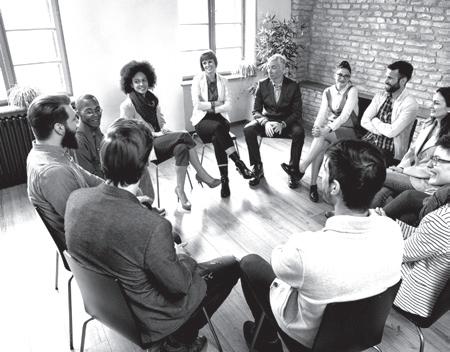
couple of hours long. In the groups, we cover three modules of content which are: emotions, people skills, and impulsivity.
These modules cover a whole range of topics, including myths about relationships and ways to challenge these, our boundaries with others, assertiveness, the function of emotions and distress tolerance, to name a few.
EMOTIVE DAYS
My days can change quickly, but generally start off with prepping for a group session and meetings. I cofacilitate two groups a week, so this takes up two mornings. I try to keep
two days a week completely free for appointments so I can focus purely on the people on my caseload who are booked in, and I squeeze admin and any training into the gaps left!
We have a reduced caseload so we can work with people intensively, which means we can really get to know them well. We have a good amount of time in supervision in ERP, which is so beneficial and ensures we don’t feel isolated. This job role can have emotive days and we can carry a high-risk caseload, so a level of supervision is needed.
My favourite thing about my job is working intensively with the people on ERP, and when we get feedback from them saying that the pathway is making a difference to their lives. It is a real highlight when we ask for a person’s thoughts in a group session, and they tell us they have been practicing the skills from the modules in their everyday life. I also feel so pleased for people in group sessions when they offer help and support to others or receive it for themselves. There is a huge therapeutic benefit from sitting with others in a safe space knowing you are held by those around you.
I am proud of my OT background, and I want my role to show that OTs can bring their experience and knowledge to areas they might not have considered working in. The hardest thing about my role is knowing how much stigma and judgement there is in society about mental illnesses including EUPD, we still have a lot of work to do as a society to end this.
You can follow Beth on Twitter @Beth_Wardle86
P28, right: Beth Wardle, ERP lead practitioner
OT-MAGAZINE.CO.UK | 29
THERE IS A HUGE THERAPEUTIC BENEFIT FROM SITTING WITH OTHERS IN A SAFE SPACE KNOWING YOU ARE HELD BY THOSE AROUND YOU























MT Push MT evo PRICES FROM £3995 MT5 THE ALL TERRAIN WHEELCHAIR eTrike MANUAL OR ELECTRIC... Find Your Freedom T:+44(0)1270 842616 WWW.MOUNTAINTRIKE.COM Explore the outdoors! Friendship Independence Family Adventure eTrike £7195 ePush * Choice of any colour * 0% Finance Available * 3 Year Warranty * Kids Adaptations
We bring you some stunning accessible holiday homes to recommend to any clients living with mobility impairments


As the nicer weather starts to creep in, we are all starting to think about holidays, and if you are working with any individuals who are living with mobility issues and have access requirements, it can be good to know where to find accessible holiday homes. Searching for appropriate holiday accommodation when you have access needs can be a daunting task, but we have discovered some of the top-rated accessible staycation venues that you can confidently recommend to your patients or clients.
ACCESSIBLE STAYCATIONS 01
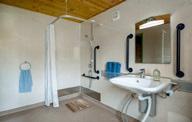
HOE GRANGE HOLIDAYS
Based in the stunning Derbyshire Peak District, Hoe Grange has to be one of the top choices when it comes to accessible accommodation. These beautifully tailored log cabins have been designed specifically for disabled people, and their understanding of accessibility has won them numerous awards and accolades over the years, with their latest achievement being the Autism Friendly Award.
The cabins are set on a working family farm, which offers little ones the chance to meet the farm animals, collect eggs from the chickens and learn about country life. The surroundings are breathtaking and you will find lots to do across the countryside, from walking and cycling routes, to parks, villages and tourist attractions.
The cabins themselves offer an incredibly cosy and relaxing retreat for a break, the living area has a log effect fire, the open-plan kitchen is well-equipped and the large double doors



open out onto a superb decking area that also boasts a hot tub (available on request).
The cabins are also eco-friendly as they are heated using renewable technologies, so you will leave a lighter carbon footprint when you stay there too.
Bedroom space is generous and the beds look inviting and comfortable. The accessible wet rooms are very well equipped and any mobility equipment required is available free of charge with the booking, the hosts simply ask that it is booked in advance to avoid disappointment.
Lovely touches like home baking on arrival, just add to the magic of staying at Hoe Grange, and the welcome you will receive here will be second to none.
Find out more at HoeGrangeHolidays. co.uk

OT-MAGAZINE.CO.UK | 31
Images: Courtesy of Hoe Grange Holidays
MOUNTAIN VIEW LODGE


If you are looking for a large, luxurious space to relax in for a break with the extended family or a group of friends, this could be the place for you. Mountain View Lodge is located in the stunning Cairngorms National Park in Scotland, and it offers guests stunning panoramic views across the rolling countryside. The secluded setting, just one mile from the village of Insh, ensures absolute tranquillity and peace, perfect for a winter escape from the hustle and bustle of daily life.
The lodge sleeps up to eight people and states that it is accessible to wheelchair users. There is a ramp leading to a side door entrance, level access throughout the spacious lodge, and two wet rooms, as well as a shower chair for use and a free-standing toilet



KNAP MILL POD
frame for use if needed. In the fully equipped kitchen you will also find that the cooking hob has been lowered to wheelchair height.
The open-plan living and dining area boasts a high cathedral ceiling and large comfortable sofas that will allow the whole family to sprawl out in comfort. The large dining table will accommodate large gatherings, perfect for feasts and party games after dinner, or you can make your way to the games room for a game of pool. The two bedrooms are beautifully appointed, one has two king size beds and the other has a king size bed, comfortable sofa bed and an en-suite wetroom.
Outside you will find a hot tub, a barrel sauna, outdoor seating and a large garden in the most picturesque setting.
Find out more at MountainViewLodge. co.uk
This accessible glamping pod in the Devon countryside is a unique setting for a staycation. Nestled on a hill in the countryside, guests are treated to spectacular views from the comfort of this romantic bolthole. The pod is designed to be accessible for wheelchair users and has an open-plan, studio style layout with a queen size bed in the bedroom area, a sofa (that turns into a sofa bed) and dining table in the living area, and a well kitted out kitchen with everything you need. The wetroom has a level access shower, shower seat, grab rails, toilet and wash basin, and the pod enjoys under floor heating throughout.





The pod is perfectly set up for relaxing in bed under the duvet watching your favourite movie on the smart TV and eating popcorn in bed, or you can venture out to the local village of Loddiswell to enjoy some heart-warming pub food. The historic town of Kingsbridge is just a short drive away where visitors can find locally sourced ingredients to whip up a meal in the pod, or they can pop up to the nearby Aune Valley farm shop. The pod is dogfriendly too, so all furry friends are welcome.
THE POD ENJOYS UNDER FLOOR HEATING THROUGHOUT





Find out more at CoastAndCountry. co.uk/Cottage/DevonKnap-Mill

32 | OT-MAGAZINE.CO.UK
Above:
Photographs courtesy of Mountain View Lodge
02
03
Above: Photographs courtesy of Knap Mill Pod
WOODCOMBE LODGES






Exmoor is home to this small family-run site of six lodges and two cottages. Set in three acres of beautifully maintained gardens, with stunning views over Exmoor National Park and plenty of space to roam around. The lodges are just a five-minute drive or a 20-minute walk from Minehead where you will find shops, pubs and restaurants.
All of the lodges are single storey and three of the lodges are accessible, the Laburnum, Cherry and Holly. These lodges have level access throughout, wetrooms


IRTON HOUSE FARM
Accessibility is a top priority for these tastefully renovated cottages based on a working farm in the North Lake District. The enviable location offers uninterrupted views of Skiddaw, Bassenthwaite Lake and the Northern Lake District fells, and outdoor pursuits on your doorstep with accessible walking and cycling routes within easy reach.

comfortable seating and flat screen TVs. Each cottage allows the guests to operate the central heating to ensure they are at their optimum temperature for their comfort and the doorways and hallways have been widened for access.
The bathrooms have roll-in showers, shower chairs, grab rails, lowered vanities and mirrors. The bedrooms are stylish and inviting, the perfect place to unwind and recharge. These cottages are ideal for couples or families and kids will love meeting the resident farm animals.

with shower chairs and grab rails. There are plenty of images on the website and a 360-degree video tour of the properties as well.
The lodges are traditional and cosy, and the proximity of the coastal town of Minehead offers visitors a great opportunity to opt for a spot of lunch or a hearty and delicious pub dinner with a glass of wine before heading back for a good night’s sleep.

The owners live onsite and will be there to welcome guests on arrival and are available for anything you need during your stay.
Find out more at WoodcombeLodges. co.uk
You will find five unique cottages based on this farm, each designed thoughtfully and tastefully with stylish touches and functional living spaces for all. The kitchen is fully equipped with everything you could need, including wheelunder sinks and hobs. The living rooms are open and spacious with
Keswick and Cockermouth are only a 20-minute drive from the farm, so you can also venture in town to explore everything on offer there too.
To find out more visit IrtonHouseFarm. co.uk.
OT-MAGAZINE.CO.UK | 33
04
Above: Photographs courtesy of Woodcombe Lodges
Right: Photographs courtesy of Irton House Farm
05
Automatic Pill Dispensers and Medication




Reminders


Our products are widely used by Health and Social Care professionals for vulnerable older people and those with learning difficulties who need to be reminded of essential daily tasks such as taking their medication.

Find out more today: pivotell.co.uk




RECOMMENDING COSYFEET TO YOUR PATIENTS IS EASY WITH OUR RANGE OF FREE RESOURCES FOR HEALTH PROFESSIONALS INCLUDING: VISIT cosyfeet.com/prof OR CALL 01458 447275 FOR MORE INFORMATION for extra wide or swollen feet Copies of our catalogue and catalogue holders Information leaflets Samples of our footwear, socks and hosiery for display or demonstration purposes NEW
STYLES
SEASON
& COLOURS
PRODUCT FOCUS
01
AIRIUM MOBILITY SCOOTER

Ideal for everyday use, the Airium scooter is super lightweight, featuring an aluminium frame and lithium-ion battery. Its heaviest part weighs just 13g, and the scooter sports an easy splitting mechanism to make storing it away in the boot of a car a breeze, making it the perfect scooter for someone who loves to travel.
FirstChoiceMobility.com
02

STAMP AND DRAG LINER
Makeup can take a lot of dexterity, and perfecting winged liner can be extremely difficult for some. The Stamp and Drag liner is a double ended pen: one side is a chunky but precise pointed tip, and the other is a stamp that makes struggling over eyeliner a thing of the distant past.
CiateLondon.com

1
EVERY ISSUE WE BRING YOU THE LATEST PRODUCTS FROM ACROSS THE MARKET TO HELP YOU IMPROVE THE LIVES OF YOUR CLIENTS OT-MAGAZINE.CO.UK | 35 2 1
PRESSURE RELIEF RING CUSHION
Featuring a memory foam core, this cushion relieves pressure on the user while sitting, and can be used in a number of settings, including at home or in the car. It helps distribute weight evenly, allowing for the user to maintain the correct seating position, and sports a washable cover for further convenience.

Aidapt.co.uk
JANSPORT ADAPTIVE BACKPACK
Part of the company’s new adaptive range of bags and backpacks that are designed specifically for the needs of people who use mobility aids, this backpack features adjustable loops and anchor straps to ensure it’s always tight and secure, whether it’s on the back of a wheelchair or worn over the shoulders.
JanSport.co.uk


WIGGLY PEGS
One for when the weather gets a bit warmer: these pegs are designed for people who live with arthritis, reduced dexterity or a weakened grip, and aid people in safely and easily hanging their washing out on a line by simply putting a finger through the loop of the peg and sliding it over the washing line.
ActiveHands.com
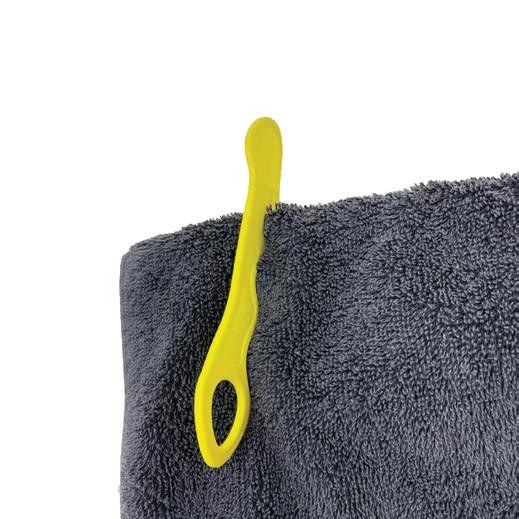
36 | OT-MAGAZINE.CO.UK 04
05
03
5 3 4
DORO 8100
An easy-to-use smartphone, the Doro 8100 has many of the functions of a modern smartphone without the confusion. It offers optimised sound quality to make conversations easier, and a simple but powerful camera for capturing life’s beautiful moments. The pre-installed Response app sends alerts to family in case of an emergency.

Doro.com 07
LONG REACH TOENAIL CLIPPERS
Keeping nails trim is especially important for people living with conditions like diabetes, but in cases where reaching their feet may be an issue, these clippers are ideal. They sit comfortably in the hand, and feature a stainless steel shank which reduces the need to bend, and an angled seated blade to reduce strain on the wrist.

StoryAndSons.com 08

JARDINIERE GARDENING TOOLS
The upright grip on these gardening tools means the user remains comfortable while doing garden work, reducing strain on the wrists. They’re made from durable stainless steel, which helps to prevent soil from sticking to them, and ensures the tools remain useful for years to come. The set also contains a pair of gardening gloves to protect hands.
Amazon.co.uk

06
6 7 8 OT-MAGAZINE.CO.UK | 37
NUTRITION AND HYDRATION WEEK
There have never been more spaces in the calendar filled with awareness days or national events seeking to promote a certain area of interest or expertise. You only need to read the news or have a look on social media to regularly see days, weeks, or even months dedicated to an area of interest. And why not? Whichever specialist area you are working in, you are bound to want an opportunity to promote it, share expertise and best practice, and get more people involved.
Therefore, the focus of this article is going to be Nutrition and Hydration Week, which is running this year from 13 - 19 March. The purpose of Nutrition and Hydration Week is to bring people together to create energy, focus and fun around the role of food and drink in maintaining health and wellbeing in health and social care settings, and to educate people on this integral part of health and social care.
One of the great things about Nutrition and Hydration Week is that anyone can take part. Whether you work in an acute or community setting, in teaching or
in the industry – there are various resources available to you on the Nutrition and Hydration Week website: NutritionAndHydration Week.co.uk/resources
WHY DO WE HAVE NUTRITION AND HYDRATION WEEK?
Nutrition and hydration are essential parts of
the care provided in health and social care settings, such as in hospitals, in care homes and in support of people living in their own homes. The reasons for this are multifactorial; what and how we eat has the potential to impact on every area of our lives and can play a part in the prevention, management, and treatment of certain conditions. We also mustn’t forget the importance of considering the social impact of eating well. Various research studies and core clinical guidelines recommend eating with others as an intervention that can help to prevent malnutrition, particularly among older adults (1,2,3). This doesn’t have to be complex. A simple, inexpensive way to positively impact nutritional intake among older adults who are living in their own homes but are reliant on
care packages, is to recommend that family members or caregivers eat with them if possible.
Perhaps the most pressing nutritional issue for occupational therapists to be aware of, particularly those working with older and vulnerable adults, is malnutrition. Malnutrition is a major public health issue in the UK, and one that does not receive the focus it requires, despite it being incredibly costly to the health service and largely preventable (4). There are approximately three million people living in the UK who have been identified as either ‘at risk’ of malnutrition or are already meeting this clinical definition. Of these people, over 90% of them are living in their own homes and older adults are disproportionately affected (5).
Malnutrition is a complex condition with many signs, symptoms, causes, and treatment methods to be aware of. OTs can play an important part in supporting their
patients and clients to prevent or treat malnutrition, and as always, collaboration with dietitians and other healthcare professionals is important. Readers can learn more from reputable resources such as the British Association for Parenteral and Enteral Nutrition (BAPEN).
MAKING A DIFFERENCE EVERY DAY – HOW CAN OTS HELP?
One of the key messages from Nutrition and Hydration Week this year is “making a difference every day”. OTs are well placed to support this message as they often have regular contact with the patients and clients that they support. One of the main signs of malnutrition is weight loss. This can present itself through subtle changes that happen over a period of weeks, months or even years. Looser clothing, poorly fitting dentures and jewellery can all be signs that someone is losing weight and may be struggling with
 Wiltshire Farm Foods’ registered dietitian Emily Stuart highlights the importance of Nutrition and Hydration Week and explores how OTs can help spread the word
Wiltshire Farm Foods’ registered dietitian Emily Stuart highlights the importance of Nutrition and Hydration Week and explores how OTs can help spread the word
38 | OT-MAGAZINE.CO.UK
MALNUTRITION IS A COMPLEX CONDITION WITH MANY SIGNS, SYMPTOMS, CAUSES, AND TREATMENT METHODS TO BE AWARE OF
their nutrition. If as an OT you’re concerned about your patient’s or client’s nutrition, there are some things you can do, including:
Open a discussion with the individual about their nutrition. You could ask if they have any concerns, have unintentionally lost weight recently or have lost interest in food.
Make a referral to a dietitian, who can provide a full nutritional assessment and a personalised Make some recommendations around improving their nutrition. Using
REFERENCES:
a food-first approach and recommending nutrient-dense foods can be very effective and is usually the first step in managing malnutrition. The British Dietetic Association outlines some ideas in their invaluable fact sheets, which can be found on their website: BDA.uk.com
There are also several initiatives that run during Nutrition and Hydration Week that allied health professionals can take part in alongside their organisations. One of the most popular ones is the Global Afternoon Tea. All the organisations
taking part in Nutrition and Hydration Week are invited to join in, and this not only shows commitment to nutritional care and helps to improve nutritional intake for your patients and clients, it’s also a great way to bring people together and create some fun around food and drink. Nutrition and Hydration Week is a great opportunity to share best practices on nutrition and hydration in your area of work and talk to people about simple yet effective tactics for improving nutritional care. See the website for more information and happy Nutrition and Hydration Week 2023!
WiltshireFarmFoods.com
1. Besora-Moreno M, Llauradó E, Tarro L, Solà R. Social and Economic Factors and Malnutrition or the Risk of Malnutrition in the Elderly: A Systematic Review and Meta-Analysis of Observational Studies. Nutrients. 2020 Mar 11;12(3):737. doi: 10.3390/nu12030737. PMID: 32168827; PMCID: PMC7146387.
2. Volkert D., Beck A.M., Cederholm T., Cruz-Jentoft A., Goisser S., Hooper L., Kiesswetter E., Maggio M., RaynaudSimon A., Sieber C.C., et al. ESPEN guideline on clinical nutrition and hydration in geriatrics. Clin. Nutr. 2019;38:10–47. doi: 10.1016/j.clnu.2018.05.024.



3. Locher JL, Robinson CO, Roth DL, Ritchie CS, Burgio KL. The effect of the presence of others on caloric intake in homebound older adults. J Gerontol A Biol Sci Med Sci. 2005 Nov;60(11):1475-8. doi: 10.1093/gerona/60.11.1475. PMID: 16339337; PMCID: PMC2276563.
4. Stratton, R, Smith, T, and Gabe, S on behalf of British Association for Parenteral and Enteral Nutrition (BAPEN) (2018). Managing malnutrition to improve lives and save money. (online). Available: www.bapen.org.uk/pdfs/reports/ mag/managing-malnutrition.pdf last accessed 22/2/2023
5. BAPEN (2018). Introduction to malnutrition. (online). Available at: www.bapen.org.uk/malnutrition-undernutrition/ introduction-to-malnutrition?start=4 last accessed 22/2/2023
OT-MAGAZINE.CO.UK | 39
NUTRITION AND HYDRATION WEEK IS A GREAT OPPORTUNITY TO SHARE BEST PRACTICES ON NUTRITION AND HYDRATION















 Steve Thompson MBE Former England Rugby player and World Cup winner
Ellie Simmonds OBE Paralympic Champion and fourteen-time World Champion
Lauren Steadman MBE Professional Athlete & Paralympic champion
Tommy Jessop Multi-award winning actor, best known for starring in Line of Duty
Isaac Harvey MBE Disability Advocate / President Wheels and Wheelchairs
Steve Thompson MBE Former England Rugby player and World Cup winner
Ellie Simmonds OBE Paralympic Champion and fourteen-time World Champion
Lauren Steadman MBE Professional Athlete & Paralympic champion
Tommy Jessop Multi-award winning actor, best known for starring in Line of Duty
Isaac Harvey MBE Disability Advocate / President Wheels and Wheelchairs
Inclusion & Disability Expo
22-23 March NEC Birmingham
Celia Hensman Co-Founder & Director, The Disability Policy Centre
National Accessibility,
Line-up now live!
Raj Senniappan Founder and Managing Director at Therapies on Thames Ltd
Mike Cowan-Jones Director of ARMS Rehab Limited
Steve Ford CEO of Royal College of Occupational Therapists
Register free naidex.co.uk
Kate Weeden Words First Principal Therapist
Samantha Renke Actor, author, journalist and disability rights campaigner
Shani Dhanda Disability Inclusion & Accessibility Specialist, Social Entrepreneur and Broadcaster
NAIDEX 2023
Will you be attending the National Accessibility, Inclusion and Disability Expo on 22-23 March?

Running for 50 years, Naidex is the flagship event for the disability community, an opportunity to make new connections, browse products, services and adaptations for independent living, share experiences, and to work together to remove barriers for an inclusive society, accessible to all. Plus, it’s a great place to meet up with friends, to enjoy an exciting day out.
Naidex is for everyone, and welcomes anyone who is living with a disability, as well as anyone caring for or supplying to the community. The event falls across two days so there is enough time for you to discover all that Naidex has to offer.
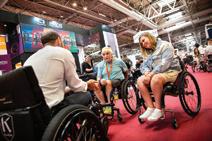
The 50th celebration of Naidex takes place on 22-23 March 2023 at the NEC, Birmingham and is free to attend.
Naidex provides content and features covering the full lifestyle arc: mobility, employment and work, health and wellbeing, independent living, family, sports, rehab/care, relationships, entertainment, food and drink.
YOUR CHANCE TO EARN CPD POINTS AT NAIDEX

At Naidex we are proud to be able to offer a CPD-accredited conference level programme designed to provide expert insight and learnings for professionals. With four theatres as well as interactive feature areas, the programme is packed with inspirational speakers, innovative technology, the latest techniques, and expert advice.
Naidex will look at how occupational therapy promotes positive mental health and wellbeing, how to make use of assistive technology to benefit
functional capabilities, improving access to education, work, and leisure opportunities, improving patient experiences, and personcentred care.
CPD is a fundamental requirement for each individual, within your scope of practice, to help improve the safety and quality of care provided for patients and the public. You can earn up to 11 CPD points across the two days of Naidex by attending seminar sessions and workshops. Additionally, as the event is colocated with UK Care Week and Neuro Convention, and your ticket gives you access to these events, there are further CPD-accredited sessions to attend at these.
NEW THEATRES TO DISCOVER
The Accessibility and Care Theatre will feature seminars drawing upon lived experience of caring for loved ones and the newest assistance technologies and adaptations that are enhancing care and independent living. The content will provide for healthcare professionals, occupational therapists and carers.
The Lifestyle and Leisure Theatre is designed to promote improvement of daily living and overall wellbeing. Attending the sessions in this fun and exciting theatre is a great opportunity to learn more about all the areas that contribute to happy and healthy living. All the way from sports to dating and sexual wellbeing, there is certainly something for everyone to enjoy in this theatre.
SESSION HIGHLIGHTS
Steve Ford (Royal College of Occupational Therapists): Stepping up for Occupational Therapy - what progress are we making?
Mike Cowan-Jones (ARMS Rehab): Using Positive Behavioural Support to Supplement Occupational Therapy Intervention
Georgia Vine (The University of Huddersfield & AbleOTUK): Critically Analysing Occupational Therapy Practice Through a Disabled Persons Eye
Charlie Beswick (Our Altered Life Author): Panel Discussion: The journey of Siblinghood and Disabilities
Annette Cmela (Hidden Disability Sunflower): Making the invisible visible and the world’s longest lanyard?
Sally Chalk (Signapse): Artificial Intelligence is transforming the way sign language users can access written and spoken languages.
OTHER FEATURES TO CHECK OUT
Naidex are working in partnership with Disability Horizons to bring you the Naidex Marketplace, where you can source smaller and affordable daily aids, tools, and resources for your clients. There will also be live demonstrations showcasing mobility and assistive tech, care, education, occupational therapy, sports and lifestyle, and accessible living solutions to help you improve your clients quality of life.
Catch Ellie Simmonds OBE, Tommy Jessop, Lauren Steadman MBE, or Steve Thompson MBE on the Main Stage. There is also a live performance space called the Village Green, where musicians, dancers, comedians, sports people, chefs, and entertainers provide demonstrations. Just part of the 50th birthday celebrations, we are bringing you a Naidex Comedy Hour with Aaron Simmonds and Lost Voice Guy on the Main Stage for free!
We can’t wait for you to join us on 2223 March 2023 at NEC, Birmingham!
You can register for free tickets at Naidex.co.uk
OT-MAGAZINE.CO.UK | 41
During the first lockdown, I had been made aware that I was eligible to apply for the Personal Independence Payment (PIP), thanks to the
Equality Act stipulating that, yes, autism is legally a disability. Here was a method of support that I had gone without for so long. Had I placed a bet as to the eventual turnout, this would have made me a rich woman.
Articles litter the internet detailing how diabolically awful the service is, and how ableism is ingrained at a base level throughout. I have a degree of privilege in that I am able to speak and engage
with people; this is so often reflected by the surprise people express when they find out I am autistic. You do not see the hours of preparation, planning, scripting to just be able to sit at the table with ordinary folk, let alone

42 | OT-MAGAZINE.CO.UK
Lydia Wilkins explains what led her to write her first cookbook, featuring recipes from over 30 autistic people with chapters addressing how to adapt for sensory issues, and advice for healthcare professionals, parents, carers and educators
adjusting. Character references had to be presented to the service. A specialist in ‘autistic girls’ (I am over 18, therefore not a girl) assessed me initially. Ostensibly I just need prompting to talk to people, and show no sign of communication issues - which is arguably the definition of autism on a medical level! I can ostensibly read without assistance, despite being a fulltime glasses wearer - with a pretty strong prescription for the lenses I have. Key skills such as cooking, despite my spiky profile and terrible motor skills limiting me in some aspects, can ‘just be learnt’. The strong implication under the spiky words of a stranger was that this was somehow a lifestyle choice I had willingly chosen.
arduous, in particular, and the whole process beyond humiliating and degrading.
The commentary around cooking and preparing a fresh meal particularly caught my eye, clicking something in my brain. I had always found this activity immensely difficult, but no one had ever suggested that being autistic may have had any kind of connection. Hypersensitivity to sound can become unbearable in a kitchen, along with smellsand that is before you actually start cooking or the consumption. Resources are lacking for putting together information on sensory issues and how to adapt, or even just the physical adaptations you can make in the kitchen, such as when
categorised with a key for sensory needs, as well as dietary requirements; most have some kind of story attached, too. I have also added a skills band - so if someone struggles, say, with timing, then they have more agency in tailoring their food to their requirements. There is also an energy rank, too. Other chapters deal with sensory issues and how to adapt, as well as advice for parents, teachers, guardians, or relatives. It was important to me to put autistic and disabled voices front and centre; there is a tiny number of non-disabled people who have made this book happen, probably less than ten.
so often used is tricky to interpret - and I am not the only person to write this out in my own words. Timings are tricky to master, and executive functioning issues can quickly become paralysing. Googling disabilityrelated cookbooks left me disheartened, as the emphasis was so often on the ‘junk science’ that if you eat better, you can ‘cure’ yourself.
Around the same kind of time, my mentor died suddenly. The last thing he’d ever said to me acted as something of a spark to the fuse of an idea, and I put pen to paper to produce The Autism Friendly Cookbook.
The Autism Friendly Cookbook has 100 recipes, with 30 coming from other autistic individuals. They are
Not all autistic individuals will struggle - but I’d argue that those who don’t are extraordinarily lucky, and probably the product of a degree of privilege, such as if someone in a supporting role has had the time to teach and adapt to your specific needs. Research is suggesting more and more that eating disorders may potentially have an overlap in autistic women, for example. Those who use a food bank are more likely to be disabled, too. A conversation about this needs to start, desperately, especially given we now grapple at the coalface with the cost of living crisis.
The Autism Friendly Cookbook is available to buy at Waterstones, Barnes & Noble and on Amazon.co.uk and Bookshop.org.
You can follow Lydia on Twitter @Journo_Lydia

OT-MAGAZINE.CO.UK | 43
Timed for the beginning of Disability Pride Month, Disability Expo is Europe’s largest event solely focused on people with lived experience of disability. During a packed 2 days we’ll be hosting a series of discussion panels looking at every aspect of disabled living, celebrating disabled talent & fashion, educating & advising, as well as showcasing the latest and greatest products & services.
 Mike Cowan-Jones Disability Expo Event Ambassador Managing Director & Occupational Therapist, ARMS Rehab Limited.
Mike Cowan-Jones Disability Expo Event Ambassador Managing Director & Occupational Therapist, ARMS Rehab Limited.


Email: info@armsrehab.co.uk

“Qualified since 1991, I thought I knew about disability. Then my family became recipients of services and so I gained another perspective. The experiences of the Disabled and Neurodiverse communities that we serve are vital to our practice.
At Disability Expo, you can hear directly from these communities on their experiences so OTs can truly work in partnership with them. Our company works this way with excellent feedback. I am honoured to be both SEND Parent Ambassador and OT Ambassador for Disability Expo and look forward to seeing you there.”
Improve outcomes for your clients by discovering the latest innovations in mobility, independent living and assistive technology.
The Manage At Home with Medequip installation will feature off the shelf products and specialist equipment for you to try in a realistic home environment. View demonstrations within the house and conduct client assessments.

The strain on our health service has resulted in long waiting lists for people to get access to the care they need to live independently. Our Community Clinic allows delegates to get an appointment with a health professional free of charge, receive advice, and start or speed up the process of care services. Find out which services you can signpost clients to.
Increase your knowledge and awareness of disability issues with our People’s Panels. Hear directly from your clientele and figures in the community.
Register your FREE ticket www.thedisabilityexpo.com Follow us on social media @DisabilityExpo_ Scan QR code to reserve your place!
podcast suited to your style and needs: if you like something that’s very information-heavy, or prefer a podcast that’s a little more casual and chatty, there’s something out there that suits your needs! The world of podcasting can be a little overwhelming to dive headfirst into if you don’t know where to start, so here are a few podcasts to get you started!

AND CHILL
OT & CHILL
This podcast from UK-based OT Kwaku Agyemang started in September 2019, and covers a wide range of topics, so you’re sure to find something that appeals to you! At time of writing, there are over sixty episodes, which covers everything from how OTs operate in other countries, to conversations with occupational therapists about their areas of expertise, and advice for student OTs. Episode 31 is a particularly interesting listen, and features OT Alice Hortop (who you may know from our previous issue) discussing the benefits and appropriateness of using humour in therapeutic interactions.
@OTAndChill

MOXIE OT PODCAST
Moxie OT aims to keep OTs up-todate on evidence-based practices, and wants to help OTs “increase their moxie”. It’s led by American OT Sarah Zera, who has been working as an OT for over twenty years. The podcast covers a huge range of topics, with occupational therapists from all areas of practice joining Sarah. Episodes seem to be uploaded on an ad-hoc basis, so subscribing will be the best way to keep up with the interesting topics presented to listeners of the Moxie OT Podcast!
Instagram: @MoxieOTPodcast
 PODCASTS ALLOW YOU TO EXPLORE PARTS OF THE OT PROFESSION THAT YOU MIGHT NOT OTHERWISE ENGAGE WITH, IN A FUN, CONVERSATIONAL WAY
PODCASTS ALLOW YOU TO EXPLORE PARTS OF THE OT PROFESSION THAT YOU MIGHT NOT OTHERWISE ENGAGE WITH, IN A FUN, CONVERSATIONAL WAY
OT-MAGAZINE.CO.UK | 45
RCOT PODCAST COLLECTION
A really interesting series of podcasts from the Royal College of Occupational Therapists that’s small but very informative. The podcast ran for a year, so there are a few episodes to tide you over on long commutes! The episode “The Robots are Coming: The Future Role of Technology in Occupational Therapy” is a particularly interesting one, featuring RCOT’s professional adviser Paul Cooper discussing the role tech will play in OT as we move into the future. RCOT also provide transcripts, which is a fantastic option for those who aren’t able to listen to the collection but would still like to take in the fascinating content.


Search “RCOT” on Spotify
SPILL THE OT
As the name suggests, this podcast aimed to “spill the tea” (that’s providing the real talk about the profession, not carelessly discarding a cuppa) about what it’s like to be an occupational therapist. Hosted by an anonymous OT, the podcast ran for almost 50 episodes until 2020, but its content is still very relevant, providing a safe, judgement-free zone for people to examine their relationship with the profession, and the parts they might want to change. The podcast makes for a really refreshing listen while still celebrating the profession.

Search “Spill the OT” on Spotify
BOUNCEOT PODCAST

From the award-winning occupational therapy social enterprise BounceOT, Meaningful Conversation aims to create conversations between occupational therapists and parents or carers surrounding the topic of purposeful play. The BounceOT team chat about their respective journeys; the episode where OT Julia Wilson explains how she works remotely from Canada as a play resource officer for the company is short and sweet, but extremely interesting. The episodes are a little shorter form than many other podcasts, which makes them very easy to digest when you just need something to fill a little time.
Instagram: @BounceOTPodcast
46 | OT-MAGAZINE.CO.UK



Email: sales@revalcc.com www.revalcc.co.uk sales@revalcc.com l +44 01656 721 001 www.revalcc.co.uk THE MARKET LEADER IN ASSISTED BATHING With more than 45 years’ experience in acute and non-acute healthcare Reval Continuing Care offers an unrivalled range of commercial quality assisted bathing solutions. Be assured of the most advanced bathing technology designed for optimum comfort and performance. • 3 year warranty • 0% finance available • WRAS compliant • Lower lifetime cost • Digital bathing technology • Spa options available • Aftersales support • Complete range of bath systems available Reval baths allow you to enjoy high quality for less. Contact us to learn more


ALL THE LATEST FROM THE WORLD OF PAEDIATRICS

PAEDIATRICS SECTION R
ecently on Instagram, we posted a quote from the legendary Fred Rogers: “Play is often talked about as if it were a relief from serious learning. But for children, play is serious learning. Play is really the work of childhood.”
We think Mr Rogers might have been on to something: play is hard work for children, and it reaps many results that most wouldn’t even think about. Improving cognition, creativity, dexterity, emotional developmentthe list goes on and on. But some children find barriers that make engaging in play difficult, and that’s where companies like Gympanzees come in. You can learn about this Bristol-based charity on page 50.
Keeping children safe while they play is also vital, and we’ve got a guide for keeping younger people safe as they explore the internet on page 52, and have a host of brilliant products that may be helpful for young clients on page 55.
Photo: Emily Negus

OT-MAGAZINE.CO.UK | 49
As ever, if there’s anything you’d like to see included in our kids’ section, don’t hesitate to email Ros@2APublishing.co.uk - oh, and you can follow us on Instagram at @TheOTMagazine for more fab quotes! 50 55
OT THROUGH PLAY
“This is paradise”, shouted CJ, a 10-year-old autistic boy bouncing up and down on the trampoline at Gympanzees summer pop-up in Bristol. CJ was obviously delighted at the sense of freedom he got from bouncing, but what CJ didn’t know was he was simultaneously developing his interoceptive system.
Interoception, the eighth sense, often known as the ‘hidden sense’, is the sense that tells us what is happening inside our bodies. Have you ever felt the rumbling in your stomach when hungry or muscle ache when you’re tired?
Sensory processing issues are quite common for children and young people with disabilities. Children can often be either over-responsive to interoceptive inputs, for example, they may have a stronger reaction to pain, or they might be underresponsive to interoceptive inputs and may not feel pain until it’s already at an intense level.

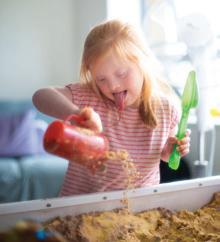

Our interoceptive system is also
linked to our emotions. For example, when we feel anxious, we experience butterflies in our stomach, or when we feel angry, our muscles tighten. It is far more difficult for children and young people with sensory processing difficulties to identify and self-regulate these emotional states. For those who struggle to identify their physical needs, like feeling tired, hungry, thirsty, in pain or needing to go to the bathroom, this can also cause emotional distress and discomfort.
Gympanzees is a charity in Bristol making waves in this area. The charity supports children and young people with disabilities to access fun and fitness. Their pop-up play
facilities designed with therapists and specialist teachers provide play, exercise and social opportunities for disabled children and young people, but there are also so many other hidden health benefits.

At Gympanzees, children and young people are given the choice to feel stuff out, try new things and see how it makes them feel. They can bounce up and down on the trampoline, play in the interactive sandpit or chill out in the calm sensory room. With several accessible rooms to choose from, parents are encouraged to let children lead the way and choose what they need at that moment. It’s like the parents become sensory detectives led by their children,

50 | OT-MAGAZINE.CO.UK
Gympanzees is a charity providing an interoception paradise for children and young people with disabilities
Photos on P50: Taken by Emily Negus, @Emily Negus Courtesy of Gympanzees
learning what works for their child.
Catherine Williams, an independent paediatric occupational therapist, commented: “Having access to a safe environment like Gympanzees where children can take risks like bouncing higher or have a completely new experience, like a wheelchair user being able to go on a go-kart for the first time, has huge benefits not only for an individual’s self-esteem and sense of autonomy, but also their ability to recognise sensations within and learn what they mean.”
By bouncing on a trampoline, children will feel their heart racing and know what breathing fast feels like. Doing heavy work in the gym involves large muscles in the body, which helps develop proprioception, which is good for body awareness and interoception. Rooms like the

calm sensory room provide a calm atmosphere that helps children pay attention to what is happening inside their bodies.
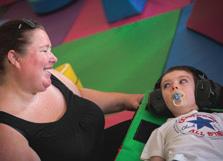

Paediatric physiotherapist, CEO and founder of Gympanzees Stephanie Wheen said: “A child on a swing at the last Pop Up decided they were enjoying it so much they asked for more and more! But after too many swings they felt sick in their stomach and wanted to stop. The child understood that internal sensation of feeling sick and will now be able to recognise it in future.”
Understanding their interoceptive system helps children learn how to self-regulate. When children are regulated, they are in a much better state to learn and cope with everyday events such as going in the bath, eating dinner, and even sharing the TV with siblings.

Stephanie continued: “We’ve seen amazing results of children learning

to self-regulate. We had a five-yearold who slept through the night for the first time after her session, and we even had an eight-year-old who ate up in public for the first time.”
GYMPANZEES
Gympanzees is a charity with a mission to enable every child and young person with a disability to access regular play, exercise and friendship, to improve their physical and mental health and wellbeing, and to lift their families out of isolation. They have spent the last four years supporting thousands of disabled children and young people and their families, and the popularity of their pop-up camps and online resources has shown the need for a permanent facility to be developed.
They have launched their capital appeal Project Home, to build a world-class facility in Bristol that will cater for people aged 0-25 years old with sensory, physical, learning difficulties, SEN and any mild to profound disability and will open seven days a week. It will provide endless possibilities for health, happiness and support and create cherished family memories. You can support Gympanzees by visiting Gympanzees.org
OT-MAGAZINE.CO.UK | 51
Photos on P51: Taken by Jon Craig @joncraig_ Photos, Courtesy of Gympanzees
SAFETY NET
Keeping children safe online isn’t an easy task, and it never has been. Now, in a world where even our fridges are connected to the internet, it feels like a monumental task to ensure that children can have access to the internet that allows them to learn and explore while still ensuring they are not at risk of being harmed or exploited or stumbling across content that is not suitable for them.
We as adults know how easy it is to disappear down the rabbit hole online, and how easy it is for people outwith our social groups to simply breeze into conversations with wildly inappropriate conversation points like they were personally invited in. The difference is that as adults, we often have a better understanding of the risks involved in our movements online: we know to check websites on places like Trustpilot when we need to know if it’s safe to shop there, or how to lock down our social accounts to ensure that only our circle of friends have access to it.
Research commissioned by Ofcom
shows that a third of children between eight and 17 have signed up for a social media profile using a false date of birth, making themselves appear older and sometimes attempting to bypass the minimum ages that platforms like Twitter, Facebook and TikTok insist their users are to join, which can be as low as 13. Ofcom notes that this puts them at increased risk of encountering content which is not suitable for their age group, or that can be harmful to them. It also may give them access to features which are disabled for young users, which can include direct messaging and the ability to view adult content.


Technology moves fast, and sometimes as busy adults, it can feel impossible for us to keep up with what’s new and popular with younger people in tech circles. How can we ensure that our children are able to stay safe online while still using it as a social and educational tool?
There are lots of aspects built into technology by their creators that can help parents safely guide their children through an online space. Games, apps, search engines, even
52 | ot-magazine.co.uk
KEEPING YOUNG PEOPLE SAFE ONLINE HAS ALWAYS BEEN CHALLENGING, BUT THERE ARE STEPS WE CAN TAKE TO HELP AND SUPPORT THEM AS THEY VENTURE ONTO THE WORLD WIDE WEB.
RESEARCH COMMISSIONED BY OFCOM SHOWS THAT A THIRD OF CHILDREN BETWEEN EIGHT AND 17 HAVE SIGNED UP FOR A SOCIAL MEDIA PROFILE USING A FALSE DATE OF BIRTH
your wifi - all of these things may have parental controls which can help you ensure that your children are safer online. Video game consoles usually offer you the option to turn off chat functions, restrict children from playing games they’re too young for, and turn off the limit to purchase things in game to prevent your child from racking up mountains of credit card debt on your behalf. On PlayStation consoles, you can even limit the amount of time they spend playing games
to provide more peace of mind. To protect your child while they’re browsing the internet, some internet providers - including Virgin and BT - allow you to filter the content that you can access online, with different user settings being available depending on who’s browsing. This means that website access can be restricted for your children but not for other users. Google Family Link is also a handy app that allows a master user to restrict content for other users, including approving or
disapproving apps.

It’s also important to be able to have an honest conversation about the things we see online, and what our children are doing online. All the parental controls in the world can’t stop them from seeing content that they may react negatively to. Even we as adults are susceptible to falling for an edited picture on Instagram showing someone with the “perfect” body type, or posts that make us feel awful about ourselves. It’s important that we’re
able to tell children that the things they see, hear and consume online might not be as true as they’re presented. Children also need to know that they can tell us about the things they experience online that make them uneasy or uncomfortable without judgement or anger. Having a trusted parent or guardian that they know will support them if they need help is key to ensuring that their online interactions are safe, and knowing who to turn to if they feel unsafe.

ot-magazine.co.uk | 53
Below: Google family link app
GOOGLE FAMILY LINK IS ALSO A HANDY APP THAT ALLOWS A MASTER USER TO RESTRICT CONTENT FOR OTHER USERS
For a free consultation and site survey please contact us and quote “OT” for all enquiries.


Contact: Joel: 07801 573278 / Angus: 07765 256537

sales@sunkentrampolines.co.uk / www.sunkentrampolines.co.uk


Sunken Trampolines are the experts in providing trampoline solutions for schools, care institutions and families across the UK.

KIDS’ PRODUCTS
EVERY ISSUE WE BRING YOU THE LATEST PRODUCTS FROM ACROSS THE MARKET TO HELP YOU IMPROVE THE LIVES OF YOUR YOUNGER CLIENTS
SWING ZIPPIE YOUNGSTER 3
This ultra-lightweight wheelchair is designed to grow with the child. The seat width and depth adjust to accommodate growing kids, and the wheelchair is designed to keep up with the active needs of young ones with great manoeuvrability, solid front stability and a stylish look too. It also folds away for easy transportation and storage.

0800 193 4588
Store.EasyLivingMobility. co.uk
MOUNTAIN TRIKE
Mountain Trike is an exceptional all-terrain wheelchair that allows users to access the outdoors in style and comfort, tackling rough terrain, sand, snow, and mud with ease, thanks to its chunky tyres and great suspension. They do not produce a specific child model because they can modify all of their models to fit and it will grow with the child into adulthood.
01270 842 616 MountainTrike.com

RAINBOW FIDGET
This rainbow fidget toy has been created to allow kids to recognise and express their feelings. One end has a smiley cloud that has happy colours flowing through the tubes, the other end has a sad cloud that only has slow drips of colours flowing through the tubes. It is designed to let children express how they feel and the colours can help soothe and calm young minds.

01227 769 400
PrimaryICT.co.uk
OT-MAGAZINE.CO.UK | 55
01
02
03
1 3 2
04
BACK TO SCHOOL COMMUNICATION CARDS

This pack of communication cards is designed to alleviate the anxiety some autistic children experience when trying to communicate in school, and is especially useful for semi-verbal, nonspeaking or non-verbal children. The packs come with a pop-it keyring and a whiteboard pen, which can be used on the blank card at the back of the pack to write whatever is needed.
FidgetsAndStims.co.uk

SCOTIA COT
Introducing the Scotia Cot, a versatile and attractive option for traditional nurseries. Perfect for community use and parents recovering from C-sections or with mobility issues. Its adjustable height and high/low functions make it easy to care for a baby whilst avoiding injury. Available for purchase or hire.

01233 635 353 Centrobed.com
SCOOGAM WOODEN PUZZLE
Get kids to access their creative and problem-solving side with this colourful wooden puzzle. The 40 different pieces come in different colours and shapes to fit together to make a huge variety of pictures, shapes and patterns that are different every time. Great for colour and shape recognition as well as hand and eye coordination. Amazon.co.uk

56 | OT-MAGAZINE.CO.UK 05
06
4 5 6
HAPPY SNAP
MindPanda have produced a set of card games that allow children to open up and share their feelings through funny games. This engaging pack of cards can be played in a multitude of ways and these games can help start important conversations about how a child is feeling in a relaxed environment, allowing you the opportunity to engage in an open and fun manner.

Amazon.co.uk
MAGIC PUZZLE BALL
Kids will love playing with these magic rainbow puzzle balls. The small coloured balls can be pushed into new spaces until all the colours are mixed up, the kids are then challenged to pop them back around the ball to their matching coloured hole. They are great fidget toys and stress relievers. Amazon.co.uk



ADAPTIVE HIGH TOPS
Part of M&S’s fantastic easy dressing range, these classic high tops are available in three different colours and a wide range of sizes. The shoes feature a cool lace-up design, but can be slipped on and off with ease thanks to the zips, and also sport M&S’s Freshfeet technology to combat odour-causing bacteria.
MarksAndSpencer.com

OT-MAGAZINE.CO.UK | 57 07
09
08
7 8 9
DIGITAL HEALTH TRACKING
Empowering your patients to manage their health at home
As occupational therapists you are used to helping the people you work
with to achieve their goals, manage their health, consider their wellbeing,
and empower them to live the lives they wish. The work you do as OTs is powerful and meaningful to those you work with, however you can’t be with your patients all the time, so it is great to have tools that will help your patients and clients to manage their health at home on their own. In this digital age we can now find an app for literally anything, from tracking our mood to helping us sleep, and these apps can come in very handy in helping people understand and manage their own
APP
This app is designed to help aid sleep using what they call dreamscapes. The team behind this app have thoroughly researched the effects of sounds on our physiology, allowing them to dive into the sounds that can help induce sleep. They talk about “psychoacoustics” and it all gets a little confusing, but all we need to know is that the team at Pzizz have made it their goal to produce sequences of sounds that will help listeners fall asleep, and get good quality sleep. There are over 100 billion sound sequences and users can adjust the narration voice to completely personalise what they are listening to. It is clinically proven to be more effective than just listening to relaxing music and has even been praised for helping people experiencing insomnia.


Download from the App store or Google Play.
Pzizz.com
SYMPLE
This app is designed to be a health and wellbeing journal that allows users to track symptoms and feelings. The user-friendly app also makes it easy to track and study factors that influence how you feel giving a better understanding of how different things affect your mood and sense of wellbeing. The ability to easily keep track of symptoms can help users when they have an appointment with a doctor or healthcare professional as it will assist them to demonstrate when their symptoms are occurring, the regularity of the symptoms and how they are affecting their daily life.

Download from the App store. SympleApp.com
This free app is very simple and easy to use, making it ideal for all users, no matter their tech comfort level. Just as the name suggests, this app is designed to guide users through breathing exercises to help promote a calming state and reduce anxiety. They explain that the app is inspired by “resonance” which they explain as “the scientific name that describes what happens when our heart rate, heart rate variability, blood pressure, and brainwave function come into a coherent frequency.” Many studies have been done on resonant breathing and have shown a range of benefits, including: reduction of inflammation, reduction of stress, improved sleep, improved resiliency and strengthening of cardiovascular function. This could be a great free app to recommend to patients as a way to reduce stress and anxiety, or as something to introduce to their daily routine.
Download from the App store or Google Play.
Follow on Instagram @TheBreathingApp
58 | ot-magazine.co.uk
This is an adult colouring app and it has been praised by users for offering the ability to actually colour in, rather than the standard “tap-to-fill” method that most colouring apps offer. It does include the “tap-to-fill” option but users can also choose what they want to colour with, whether that be pencil, pen, paint strokes or more. The great thing about this app is that users can also choose their own colour palette for use, and there are over 2,200 different illustrations to choose from with more being added every day. Colouring is a therapeutic and calming activity that can be done anywhere, this app could be a great relaxation tool for many.
Download from the App store or Google Play.
PixiteApps.com
This app is the ideal companion to help keep your patients hydrated throughout the day. The health benefits of drinking plenty of water are well-known, from improving organ function to relieving fatigue and aiding digestion, keeping hydrated is an important part of our daily lives. However, drinking water is something that is easily forgotten by many due to other responsibilities, stressors, or illness. This app will send scheduled reminders to encourage users to drink water during the day. It will set a recommended water intake goal based on the user’s gender, height, weight and activity, and the amount of water consumed can be logged, giving users an overall view of their water intake for the day. It’s a great tool for people living with dementia to ensure they stay hydrated, but it can be beneficial for everyone.


Download from the App store or Google Play.
AqualertApp.com

your device. When you download this app you just select “no Fitbit yet” and it will set up the mobile tracker on your device. This app is ideal for anyone looking to increase their exercise through walking or running, this may be to improve heart health, lose weight, or improve mental health. Whatever the reason, it is always great to see your own personal progress on paper (or screen), this can also encourage users to keep going, increase activity levels and as a result improve health and improve wellbeing. Getting out more for walks can also often increase social interactions for users which is a great benefit as we are all naturally social beings.
Download from the App store or Google Play.
Fitbit.com

ot-magazine.co.uk | 59
YOU CAN’T BE WITH YOUR PATIENTS ALL THE TIME, SO IT IS GREAT TO HAVE TOOLS THAT WILL HELP YOUR PATIENTS


Visit stand J33 at Naidex to claim your FREE tote bag when you sign up to The OT Magazine for only £9.99 ot-magazine.co.uk/subscribe | 0141 465 2960
STAIRLIFT SAFETY
What OTs need to know about the new stairlift regulations
ew regulations are coming into force this April for the UK stairlift industry prioritising safety for users. There are several changes coming into effect and OTs should be aware of what these are to ensure you can confidently advise your clients when exploring stairlift options.
There are four main regulations that you need to be aware of, and these should be implemented on all new straight or curved stairlifts: 01
INTERLOCKING ARMS
These provide extra safety for the user as they secure in place for the journey
02 SEPARATE EMERGENCY STOP BUTTON
This ensures users can stop the stairlift at any point if they are in distress 03
SEATBELT DETECTION SYSTEM
This detection system will not allow the stairlift to move if the seatbelt is not done up
What impact do you think the new regulations will have on partners and end users?
Time will tell. For end users there may be some cost implications, but these of course are balanced by a greater level of reassurance on the safety of stairlifts. I think the extra features of the lifts will require a little more explanation from our partners when they sell the lift and then provide the final handover to the user, but I don’t see this as being an obstacle. For some, there has been some confusion on how to correctly interpret the regulations, but I am confident this will become clear in time. The regulations were designed with the users’ safety and wellbeing in mind, so the impact has got to be positive.
How do you think the new regulations will affect the stairlift industry in general?
04
2-WAY VOICE COMMUNICATION DEVICE
This will ensure that if a user is stuck or in distress while on the stairlift they can contact someone for help

The OT Magazine spoke to Rick Bennett, Northern European business manager for Access BDD, one of the UK’s leading suppliers of stairlifts to find out more about the changes coming into practice and how these will affect the industry and the end user.
I sincerely hope that everyone will take the regulations seriously; we at Access certainly have. I think it would be very unfortunate if others try to circumvent the guidelines because at the end of the day they are there for safety reasons.
Do you think all the new regulations will have a positive impact?
Yes of course. They are there to improve safety, so as long as people understand the spirit of this, it can only be a good thing. It remains to be seen whether everyone will do their best to comply. We certainly are, and I think if all the leading stairlifts suppliers also do their part, it will set the scene for the market in general, and all will follow suit.
Have you had any feedback from partners about the new regulations?
Some have expressed confusion on how to interpret the regulations and in turn concern about the responsibility this puts on them. However, I think from most the feedback has been very positive, and I certainly think
OT-MAGAZINE.CO.UK | 61
N
Images P62: courtesy of Access BDD
everyone agrees that anything designed to improve the safety of the user is a good thing.
Is there anything you feel could have been added to the new regulations?
We have often thought about the need for some kind of qualification or method of assessment for people who are selling stairlifts, to ensure they correctly assess the end user and situation, so the best solution is provided with the safety and comfort of the end user in mind. Whether the best place for this is in EN 81-40 is open to debate, but I think it’s an area that deserves more attention.
What impact have the new regulations had on Access BDD?
For us as a supplier the most important impact has been on the accelerated development of our products. For example, we have just launched our new straight stairlift, the HomeGlide, which is fully compliant. All our products are now fully compliant with the new regulations. As a company we are strongly focused on being a market leader in both technology and safety, so we were already very aligned in our strategy to comply with the
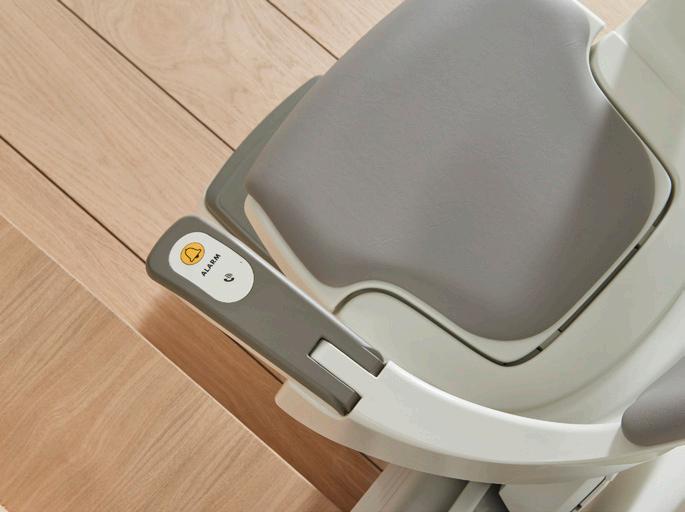
requirements of the regulations. We have retrained our technical and sales staff to ensure they understand the new regulations and how they affect our products. It’s early days, but certainly we see the new regulations very positively. We are all about improving safety, so we have welcomed them.
Here at Access BDD, we believe in exploiting the latest state-of-the-art
technology to help people to continue living safely and independently in their home while also providing peace of mind to family members. We are very committed to investing in the research and future product development of new stairlifts and access solutions, so watch this space!
Visit AccessBDD.com for more information.

62 | OT-MAGAZINE.CO.UK
OTAC® – a free one-day event for OTs involved in home adaptations


























Have you registered for an OT Adaptations Conference in 2023? Attendance is FREE and it’s a great way to find out about the latest equipment and hear from leading speakers in the field of adaptations



The OTAC® regional conference programme provides occupational therapists (OTs) with up-to-date talks and the opportunity to get hands-on trying out the latest products. From Leeds to Cambridge and Cardiff to Chester, the one-day OTAC® conference and exhibition programme is trusted to provide OTs and professionals involved in assessing for adaptations one stop shop access to the latest thinking in home adaptations, specialist talks, opportunities to network with peers and a chance to speak to a range of product specialists all in one place.

Tuesday 16th May 2023 Farnborough International Exhibition and Conference Centre 9:30am - 4:30pm South F F 1 C
OTAC Bristol Aztec Hotel & Spa Wednesday 15th March 2023 OTAC Llandrindod Wells The Metropole Hotel Wednesday 22nd March 2023 OTAC Leeds Weetwood Hall Estate Wednesday 19th April 2023 OTAC Belfast The Malone Hotel Wednesday 10th May 2023 OTAC Cambridge Hilton Cambridge City Centre Wednesday 14th June 2023 OTAC Chester The Queen by Best Western Wednesday 13th September 2023 OTAC Tunbridge Wells The Spa Hotel Wednesday 8th November 2023 OTAC London/Watford Hilton Watford Wednesday 29th November 2023 OTAC Cardiff Vale Resort Wednesday 13th December 2023 To find out more call us on 02921 900402 or to register FREE for an event near you visit our website www.OTAC.org.uk Tickets include full refreshments including lunch and there is FREE parking at the venues. Sponsored by ® ® ® ® ® ® QualityProductsYouCanTrust Trackers Epilepsy EasylinkUKhave suppliedAssistive Technologiesfor over38Years. Epilepsyseizure detectionalarms Safeguarding productsfor children Educational supportproducts Videomonitoring Wedon’tcutcornerstokeepourpriceslow Visituson StandE3 2023 www.easylinkuk.co.uk T:01536264869
EVENTS CALENDAR
KIDZ TO ADULTZ EVENTS
Middle
16 Mar, CBS Arena, Coventry
South
16 May, Farnborough International Exhibition and Conference Centre
Wales & West
21 Sept, ICC Newport, Wales
North
Nov – dates and venue TBC
Free exhibition dedicated to children and young adults with disabilities and additional needs, their families, carers and all the professionals who support them, the events are packed with exhibitors and boast a great CPD seminar programme.
KidzExhibitions.co.uk
OTAC EVENTS
Bristol
15 Mar, Aztec Hotel & Spa
Llandrindod Wells
22 Mar, Metropole Hotel and Spa
Leeds
19 Apr, Weetwood Hall Estate
Belfast
10 May, The Malone Hotel
Cambridge
14 Jun, Bar Hill Hotel by Best Western
Chester
13 Sep, The Queen by Best Western
Kent
8 Nov, The Spa Hotel
Watford
29 Nov, Hilton Watford
Cardiff
13 Dec, Vale Resort
The UK’s only free Occupational Therapy Adaptations Conference and Exhibition. At each event, you will find expert seminars and exhibitors specialising in home adaptations and equipment, and invaluable CPD opportunities. OTAC.org.uk
EUROPEAN NEURO CONVENTION
22-23 MAR, NEC, BIRMINGHAM
Europe’s only trade event for brain and spine experts. Two days packed with workshops and expert industry speakers, the chance to gain free CPD, meet with suppliers and network with like-minded people that can share their knowledge and solutions to improve patient outcomes in the neurological sector. NeuroConvention.com
NAIDEX 22-23 MAR, NEC, BIRMINGHAM
Naidex returns in 2023 to celebrate its 50th anniversary. Boasting a dedicated CPD seminar programme, a wide range of innovative exhibitors, interactive demonstrations and expert speakers, this year’s event promises to be unmissable. Nadiex.co.uk



UK CARE WEEK 22-23 MAR, NEC, BIRMINGHAM
This event showcases the technology, products and content that will not only enable care homes to implement high-quality, person-centred care models, but also inspire business growth as a result.
CareHomeExpo.co.uk
64 | OT-MAGAZINE.CO.UK
We take a look at the packed calendar of events and exhibitions that are lined up for OTs in 2023! Get your CPD lined up for the year and plan the events you want to attend this year.
RESIDENTIAL AND HOME CARE SHOW
26-27
APR, EXCEL, LONDON

This show is part of Health Plus Care, and the show will focus on how you can improve the quality of care you offer, workforce recruitment and retention challenges, and how social care can better integrate with the NHS, as well as covering personalised care, safeguarding, dementia, CQC inspections, employment laws and new technologies.
HealthPlusCare.co.uk/Residential
RCOT ANNUAL CONFERENCE
14-15
JUN, VIRTUAL EVENT
RCOT’s Annual Conference is now held as a virtual event to allow more OTs to access the content and opportunities available over the two days.

It is packed with interactive sessions, opportunities for informative meetings, sociable and networking sessions, exhibitor/ sponsor skills exchanges and demonstrations, and much more, inspiring discussion and involvement.
RCOT.co.uk
DISABILITY EXPO
6-7 JULY, EXCEL, LONDON
Disability Expo is a new event for 2023, and it promises to be the UK’s leading person-focused event for disabled people. This free-to-attend, two-day event will offer relevant services, products and information and the full event programme will comprise inclusive activities, performances and discussions from engaging and relatable people, sharing their experiences, skills and expertise.
TheDisabilityExpo.com
PMG CONFERENCE
10-12 JULY, THE INTERNATIONAL CENTRE, TELFORD
PMG’s annual conference provides an educational industry exhibition and networking events for professionals working in the field on posture and wheeled mobility.
PMGuk.co.uk
COTS 2023
12
JULY, WESTPOINT ARENA, EXETER
The Care and Occupational Therapy Show is the only trade show dedicated to care home professionals and occupational therapists in the south west of England. Discover products and services on the exhibition floor, attend a variety of panel discussions and listen to keynote speakers who are internationally renowned experts in the field of healthcare.
CareExhibition.co.uk
THE OCCUPATIONAL THERAPY SHOW

22-23
NOV, NEC, BIRMINGHAM
A vital date in the OT diary, The OT Show will return this year with an outstanding line-up of speakers, seminars and workshops. The show is dedicated to bringing OTs more CPD opportunities than any other event and the exhibition floor will be packed with organisations catering for the independent living market.
TheOTShow.com
OT-MAGAZINE.CO.UK | 65 2023
Date of birth: (DD/MM/YYYY) What area of OT do you specialise in?:

Payment Method: Cheque (enclosed) Card (Details below) Card Type: Visa Mastercard Switch Solo
Card Number: Valid From: Expires:
66 | OT-MAGAZINE.CO.UK CALL: 0141 465 2960 ONLINE: OT-MAGAZINE.CO.UK/SUBSCRIBE YOUR
PAYMENT Name Address Postcode Tel: Email
I would like The OT Magazine to contact
I would like to subscribe to The OT Magazine for:
DETAILS
me
1 Year (£9.99) 2 years (£17.99)
make all cheques payable to ‘The OT Magazine’
CVV: Please
Successful completion of the EDGE People or Children Handling and Risk Assessment Key Trainer’s Certificate courses will provide delegates with the up to date skills, knowledge and tools to teach others in safer people or children handling skills and to conduct moving and handling risk assessments.
• Professionally and Academically Accredited
All our People and Children Handling and Risk Assessment Key Trainer’s Certificate courses are accredited by RoSPA Qualifications to Level 4 or Advanced Level 4, as a customised award. They are Royal College of Occupational Therapists (RCOT)


Approved Learning Awards, certified by the CPD Certification Service and aligned to the Skills for Health Core Skills Training Framework (CSTF).

• Extensive Training Resources, Exclusive On-line Library and E-Learning Module



Our training is supported by a professionally
produced and fully illustrated course textbook, proposed documentation for onward training delivery, four video modules demonstrating over 45 moving and handling practical skills techniques, an extensive and exclusive on-line resources library and a user-friendly e-learning programme designed for front-line staff.

EDGE services 01904 677853 enquiries@edgeservices.co.uk edgeservices.co.uk Moving KeyHandling& CertificateTrainer’s @EDGEhandling /EdgeServices Follow us on: Delivered acrossin-housethe UK 2023 Public dates live on our website EDGE services Part of the RAH Group EDGE services The Manual Handling Training Company EDGE services Awareness & Wellbeing Training Level 4 Award
Training you
can Trust
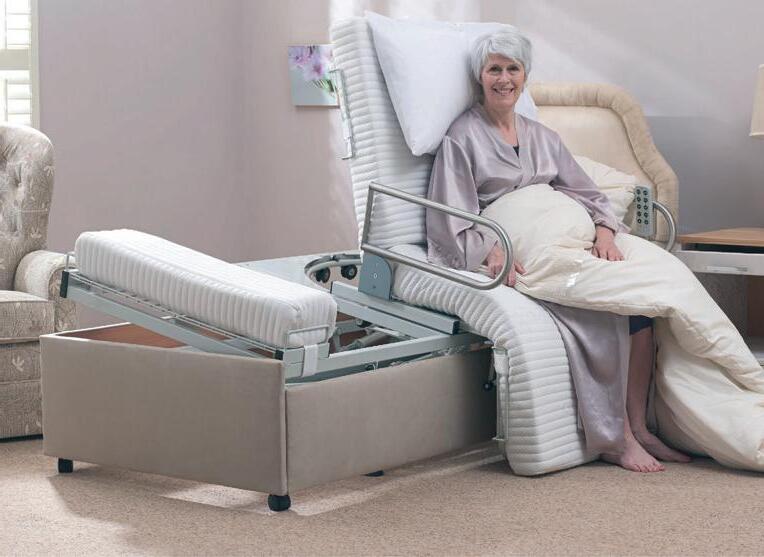












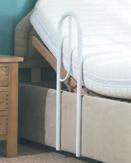






































 CAMPBELL DESIGNER
CAMPBELL DESIGNER
































































































































































 Wiltshire Farm Foods’ registered dietitian Emily Stuart highlights the importance of Nutrition and Hydration Week and explores how OTs can help spread the word
Wiltshire Farm Foods’ registered dietitian Emily Stuart highlights the importance of Nutrition and Hydration Week and explores how OTs can help spread the word


















 Steve Thompson MBE Former England Rugby player and World Cup winner
Ellie Simmonds OBE Paralympic Champion and fourteen-time World Champion
Lauren Steadman MBE Professional Athlete & Paralympic champion
Tommy Jessop Multi-award winning actor, best known for starring in Line of Duty
Isaac Harvey MBE Disability Advocate / President Wheels and Wheelchairs
Steve Thompson MBE Former England Rugby player and World Cup winner
Ellie Simmonds OBE Paralympic Champion and fourteen-time World Champion
Lauren Steadman MBE Professional Athlete & Paralympic champion
Tommy Jessop Multi-award winning actor, best known for starring in Line of Duty
Isaac Harvey MBE Disability Advocate / President Wheels and Wheelchairs




 Mike Cowan-Jones Disability Expo Event Ambassador Managing Director & Occupational Therapist, ARMS Rehab Limited.
Mike Cowan-Jones Disability Expo Event Ambassador Managing Director & Occupational Therapist, ARMS Rehab Limited.






 PODCASTS ALLOW YOU TO EXPLORE PARTS OF THE OT PROFESSION THAT YOU MIGHT NOT OTHERWISE ENGAGE WITH, IN A FUN, CONVERSATIONAL WAY
PODCASTS ALLOW YOU TO EXPLORE PARTS OF THE OT PROFESSION THAT YOU MIGHT NOT OTHERWISE ENGAGE WITH, IN A FUN, CONVERSATIONAL WAY




























































































































